#and so many shows regress their characters in a fight in order to be able to have a fight and resolution
Explore tagged Tumblr posts
Note
Top 5 Couple Fights
Oooooooh this is fun! Thank you for a relatively easy category because so often the fights in these shows are unearned and it is very frustrating. I'm still limiting myself to 2023!
Wen and Alan, Moonlight Chicken

This fight felt real, it felt lived in, and it felt heartbreaking even though we only saw some of it. These two men love each other, but love isn't enough to keep them together, and that realization is as heartbreaking as the fight itself.
My Personal Weatherman
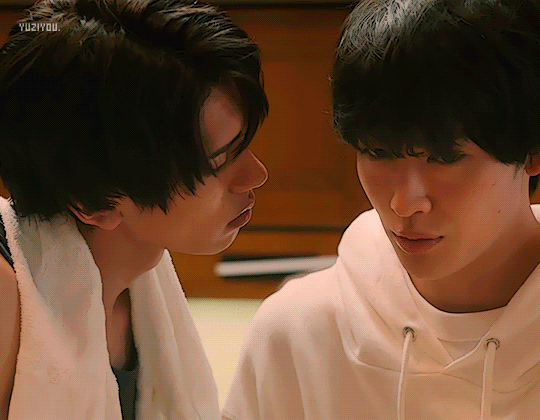
I am obsessed with the fights in My Personal Weatherman because the characters often don't know they're in one, or are in two different fights at the same time. This is all tied to how much I love how well the miscommunication is done in this show. These fights are legible based on what we know about these characters and what they've seen, even when they're completely unnecessary, and I adore that. Of course the best one is the ending fight and not just because Segasaki ties up Yo's wrists in his shirt.
Jack O'Frost
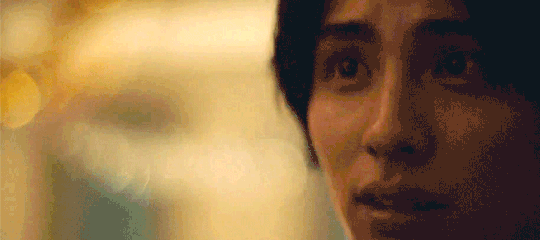
[Not enough gifs of this actual fight and I need to finish this list so this is what you get]. The fight at the very start of this show escalated so quickly, at first I wasn't sure about it even while I appreciated the performances and the intimate way it was shot. But when we get the backstory and we finally understand how much has been withheld and said vs. not said between them, and where their anxieties were rooted and the source of these big feelings, this fight makes so much more sense. This is a show that really benefits from being watched more than once.
La Pluie
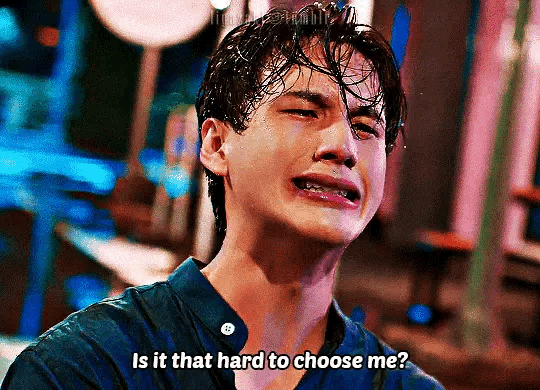
[for some reason tumblr is giving me this link to Shan's blog rather than @liyazaki so tagging you, friend!]
Patts was pushed and pushed and pushed, and he lashed out in his insecurity, and when he asked for reassurance (this lineeee) Saengtai refused to give it to him and instead lashed out out of his own insecurity. This was a painful fight that was fully earned; all of the characters and their choices were legible even as they were infuriating. And it led to a critical awakening of Saengtai who was so caught up in his own sad boy narrative he hadn't realized how much he was hurting everyone around him.
My Beautiful Man S2
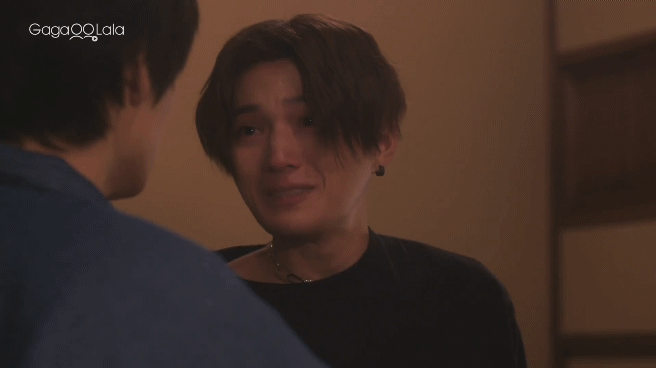
Kiyoi and Hira's communication issues continuing past S1 is very believable. I said elsewhere that Hira's work on his self-worth is more like a spiral than a straight line and that's very relatable and realistic. Kiyoi being hurt by Hira not valuing Kiyoi's feelings was such an important lesson for Hira to get more than once. Again, so earned, and resulted in the characters self-reflecting and moving a little closer to whatever a healthy relationship means for these two lol
Laws of Attraction

How much do I Love Tinn seeing right through Charn and Charn being big mad at him for Perceiving him so well? All of their fights are so good because they're about boundaries and mutual respect at their core, and they actually listen to one another and are based on how well they know one another (rather than what so often happens, when the characters seem to forget who the person they're in love with actually is). This barely counts as fight but I love it and it's my list so it stays.
Bonus entry that's only for me (shh stop counting the above):
Mr. Cinderella S2
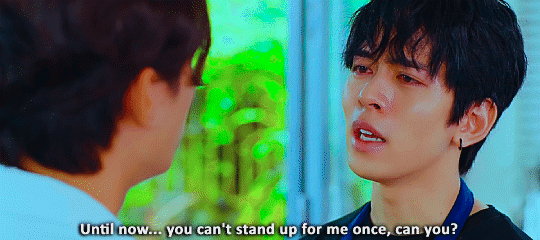
Nobody but me and like 2 other people watched this show, but I'm actually obsessed with the couple fight in Mr. Cinderella s2 so thank you for the chance to rant about it on main some more. I need to start by saying: this plot is ridiculous and the ending sucks. But within this show, Dung and Khoa have an established relationship that has been tested in S1 and is being tested harder in S2, and to a point, they actually stand together and weather the storm, and it was rewarding to watch. And then slowly everything happening ("everything" here being an ABSURD amount of melodrama) starts to wear on Khoa, who sees himself as the one solely responsible for everything, and he unlearns some of what he learned in s1, he stops relying on Dung as his support, stops telling Dung what's going on because he doesn't want to burden him, and stops trusting Dung's word about what is happening. And so, when the jealousy plot hits, it's actually believable that Dung would be mad at Khoa, not for cheating, but for not respecting Dung as a partner in their relationship. It's well done, I wish so much that it were in a better show so that I could actually recommend anyone watching (I don't). I've seen this trope (assumed cheating) done so badly and so unearned in so many shows, this was so refreshing.
Extra bonus: Best couple fight scene of all time?
Gameboys S2
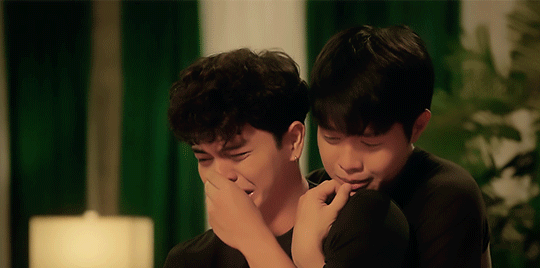
[I give up on gifs of this scene; have them upset for other reasons instead!]
What I love about the way they fight in this show is that, beyond it being earned etc. etc., the dialogue is so raw. They repeat themselves, they just yell over one another, they get rude, they try saying something to de-escalate and it gets worse instead. This is not a carefully crafted speech, or a single perfectly delivered devastating line; this is raw emotion. I recognize this fight, I've been in this fight, this is what I sound like when I fight lol And we see them really fight at least twice, and the way they fight in ep8 has changed as a result of the earlier fight is also SO good.
#2023 round-ups#bl meta#multi bl#thank you for the ask!#this one was very fun#i got close to actually being good about following the rules on this one...sort of#moonlight chicken#my personal weatherman#taikan yoho#jack o'frost#la pluie#my beautiful man s2#utsukushii kare#laws of attraction#mr cinderella s2#twig talks#gameboys s2#i feel very strongly that a fight needs to be about the characters as they are and where they need to be in order to work as a couple#and so many shows regress their characters in a fight in order to be able to have a fight and resolution#rather than letting the characters actually grow and mature#anyway I have strong opinions about fights and they're rarely done well lol
108 notes
·
View notes
Note
everyone’s traumatized asses except 001 and 456 regressing at once in between games fic/hcs?
i just think it’d be neat 😌.
Thanos and Nam Gyu and definitely either breaking down or breaking something/someone else.
In between games AgeRe Headcanons
(Characters written about include: Thanos, Nam-gyu, Min-su, Dae-ho, Young-mi, and Hyun-ju. In that order.)
(Mentions of drug usage with Thanos and Nam-gyu. Mentions of death as well.)
Some characters don’t have as many headcanons as others do, since I had trouble with not making this super repetitive, which I do hope it’s not.
Thanos
•If his high hasn’t worn off yet, he’s probably very happy and giggly after the games, despite everything that happens during them.
•If his high has worn off, then he’s the exact opposite. He gets very quiet and just curls up in his bed, trying not to think of all the deaths he saw.
•After Red Light, Green light, Thanos was terrified out of his mind, which ultimately caused him to regress. He was in too much shock that he couldn’t really do anything, besides quietly cry.
•Was in and out of his regression during the Mingle game and then fully regressed right after.
Nam-gyu
•He was also regressed during the Mingle game, but definitely a lot more than Thanos was, and stayed regressed for a little while longer afterwards.
•Once his high wears off, he’ll just sleep for a while. The games and deaths don’t seem to affect him as much as they do Thanos, but they obviously do still affect him, he just tries to hide it.
•After the fight at night was over, Nam-gyu hid in Thanos’s bed, underneath the blanket while clutching onto his necklace. The pills had worn off by then, so his rage and violent behavior was gone and the reality of what happened was starting to set in.
•It’s not super, super obvious to the others that he’s regressed, but they do think his behavior is a bit odd at times. Nam-gyu will sometimes walk around while being wrapped up in a blanket or just carrying it around with him. He’ll also sometimes start giggling and jumping around the place, mostly staying near his bed area.
•If he sees someone giving him a dirty look for the way he’s acting, he’ll look at them with a very evil and scary glare, to show he’s tougher than they are. (Or what he thinks is in evil glare. In reality, he’s really just pouting at them.)
Min-su
•He’s extremely timid and will cling to Se-mi when he regresses after the game.
•However, after the Mingle game, he was going to hide in his bed, but Thanos made him come out and stayed with him the entire time, along with Nam-gyu, but he wasn’t nearly as caring as Thanos. (Min-su couldn’t tell if he actually cared for him, or if it was another manipulation tactic.)
•Definitely was regressed during and after the fight in the middle of the night..
Dae-ho
•Stays with Jung-bae constantly and follows him around everywhere he goes. He’ll also hide behind him as well, which doesn’t work out too well, considering he’s taller.
•The rest of the group (Jun-hee, Gi-hun, and In-ho) will also try to help and comfort him, but Jung-bae is usually the one to have the most success.
•Definitely not as talker or energetic right after going through one of the games. He just stays quiet, unless someone speaks to him. He’ll only respond to people in the group. He won’t talk to anyone else.
Young-mi
•She stays around Hyun-ju and Geum-ja at all times.
•She’s extremely quiet, but she almost always looks like she’s about to cry. She’s often really teary eyed.
Hyun-ju
•She also tends to stay around Geum-ja as well.
•She’s not as scared or anxious as the others, but she’s obviously still upset over the situation and what happened.
•However, she was a total wreck after Young-mi’s death. Geum-ja tried to provide her comfort and care, but it didn’t calm the poor girl down at all.
•Gyeong-seok was the only one who was able to help her calm down after a lot of time and patience.
#squid game agere#squid game#squid game season 2#squid game thanos#squid game nam gyu#squid game min su#squid game dae ho#squid game young mi#squid game hyun ju#thanos squid game#nam gyu squid game#min su squid game#dae ho squid game#young mi squid game#hyun ju squid game#thanos#choi su bong#nam gyu#min su#dae ho#young mi#hyun ju#fandom agere#agere fandom#agere headcanons#age regression
44 notes
·
View notes
Text
SU rewatch- S1E11- Arcade Mania
Hey, long time no see!
I’m desperately bored in solitary quarantine at university right now, and decided to try and pick this SU rewatch series up again for fun. It’s been a while since I’ve watched through the show in order. Plus, now that this show is completely finished, there’s plenty more connections to make. I can’t promise I’ll be consistent with this, but at the very least I can have fun trying to make a few more posts at my leisure.
Anyways. With that business out of the way. Let’s get right on to the show!
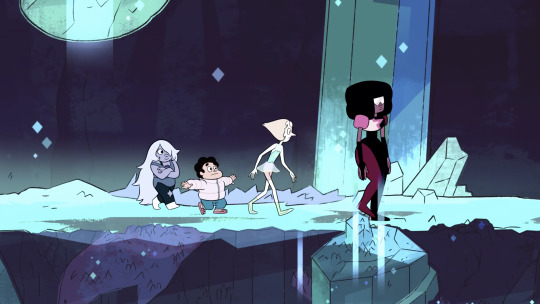
We begin with yet another mission Steven’s guardians have brought him along on! I believe this is the fifth mission we know of that he’s accompanied them on so far. (Lunar Sea Spire, Inverted Pyramid, the unknown mission he returns from in Tiger Millionaire, the desert, and now this one.) It’s really sweet seeing the Gems begin to trust him tagging along more often. There will come a day in the near future where missions become routine for Steven, but in these early episodes, you can really tell that each and every one is a brand new adventure.
In terms of plot, though, this episode is honestly Future Vision: The Prequel.
We learn a lot about Garnet’s abilities and her role in the team here, even if all of these details aren’t spelled out word-for-word quite yet. Hints towards her future vision we see this ep include:
Garnet moving ahead of the group to be in the perfect spot to catch Steven when he falls.
Her flawless moves while fighting and dodging the monsters.
Her becoming a master at the rhythm game later in the episode.
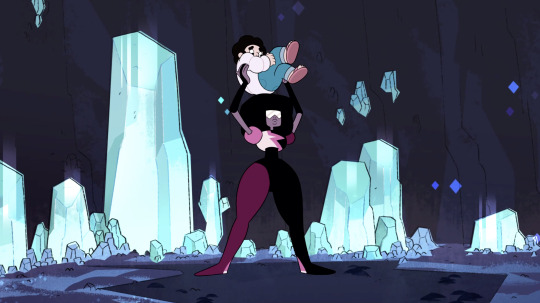
Like, damn. Look at this.
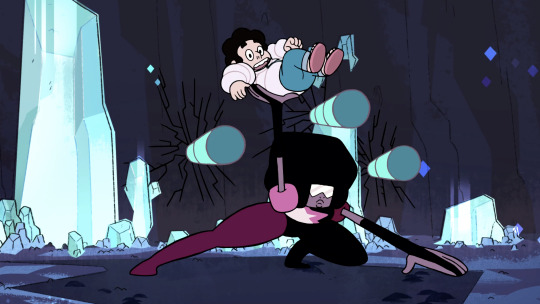
Look at her go.
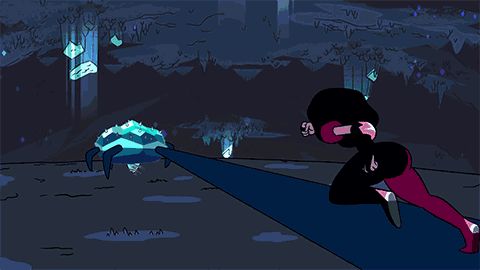
My Q U E E N!
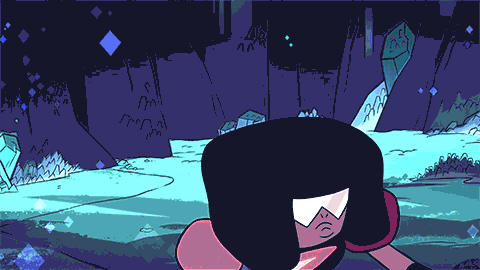
I had to gif all of this just because it’s such a beautiful and smooth sequence of animation.
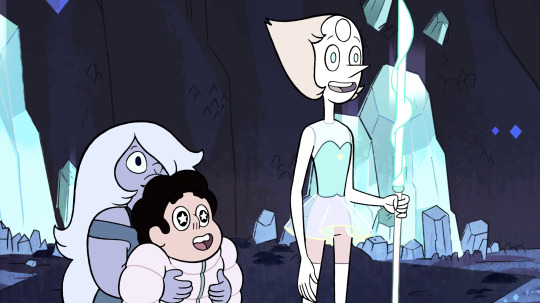
If there’s one thing all of the Crystal Gems can 100% agree on, it’s that Garnet is friggin’ amazing.
Garnet: “Let them go. They’re just parasites. If they want to be a problem, they’ll have to answer to me.”
So, does this statement mean that- at this present moment- her extended stay at the arcade was entirely beyond her future vision? That the only futures she saw were ones where she was actually present to deal with containment of the Gem parasites? Given that later scenes insinuate she’d never been to the arcade before, and would have no “data” about its games to factor into her internal understanding of the world, this seems likely.
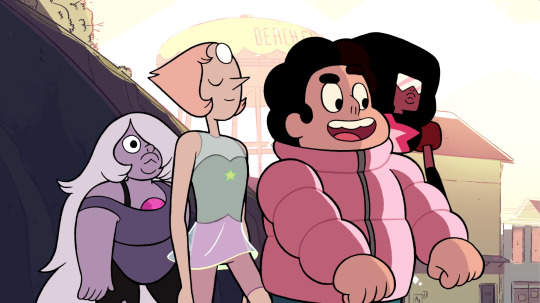
I adore the gradual palette change here, from shadow, to setting sun. It’s a nice detail that adds so much more life to what could otherwise be a rather mundane transition scene. It seems like unique palettes were more common in early SU- I wonder why Crewniverse stopped implementing these as often later on?
Pearl, entering the arcade: “Humans find such fascinating ways to waste their time.”
Thanks, Pearl. Love you too. <3
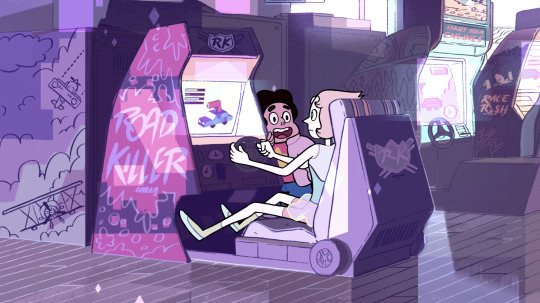
This sequence of Pearl failing at playing a car chase/road rage game hits so much different knowing what happens in Last One Out of Beach City. It’s genuinely radical how far she grows in confidence from this point, because here, she seems so shackled to rules and guidelines. Now that we know about her rebellious past, it might be tempting to write this characterization off as “early series weirdness,” but... I don’t think that’s what’s happening here.
Instead, I wonder if she’s working through grief-related regression.
Think about it... the pain of Rose’s passing is still so fresh for her. She was a rule breaking rebel once, yes, but she spent all of those days at Rose’s side. And I get the sense that she’s poured so much of herself into keeping Rose safe, into the rebellion against Homeworld, that without those, she’s caught in a vacuum. What IS her purpose now, when the very person she rebelled for is gone?
So she slips back into old pearl-like habits. Chronic rule following, and a fear of deviating from norms. How familiar. Thankfully, much of her arc throughout the show is her directly growing beyond these habits to live boldly as her own Gem.
The friggin video game when Garnet knocks its head off: “TELL MY WIFE I’M SORRYYY!!!”
Yo, what the fuck. This line is both hilarious and messed up, all at once. Please tell me the game isn’t sentient.
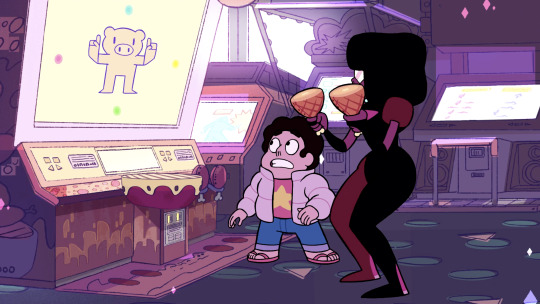
Aaaand here we finally introduce Garnet to the video game sensation that is Meat Beat Mania! This game is perfectly suited to her and her power of foresight because its patterns are algorithmic and not vulnerable to spontaneous deviations, and thus easy to predict, with enough input. She’s probably getting a quick rush of satisfaction with every correct move, and she barely has to exert any energy with her future vision to get that rush. After years and years of wading through endless possibility at every avenue, this video game’s patterns must be a rejuvenating breath of fresh air.
It’s addicting.
...Kinda makes me think of how I get sometimes when I play solitaire on my phone for an hour straight. After a while, I barely even think, I’m just shuffling through my deck and moving cards almost on automatic. I don’t have to use much energy to play, and it gives me animated fireworks every time I finish a match. It’s a win-win.
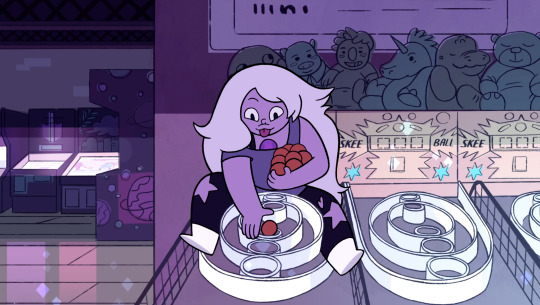
Amethyst: “I’MMA WIN AN AIRPLANE!”
I don’t know what it is about the way Michaela Dietz says the world “airplane,” but this makes me laugh every time. Does... does she think she can win a genuine airplane here because she saw Onion win a tiny motorbike from the ticket booth?? Amethyst, oh my god. XD
She’s got the spirit, this wild child.
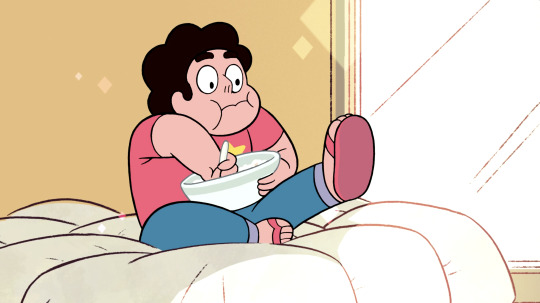
So, moving on- we meet up with our crew later the next morning, Garnet nowhere to be seen. There’s an interesting exchange I’d like to highlight real quick-
Pearl: “If we’re supposed to fight a giant foot, Garnet would let us know.” Amethyst: “Yeah, Garnet’s the boss!” Pearl: “Well, we’re all a team. Garnet just has heightened perception that guides us towards our mission objectives.”
Considering the specific phrasing Pearl uses here- “heightened perception” instead of “future vision-��� did Garnet outright tell the two of them to not explain her powers, just like she told them not to mention she’s a fusion? Because I’m pretty sure no one ever uses the phrase “heightened perception” again in reference to her powers.
Given the fact that Garnet chose to keep the knowledge of Ruby and Sapphire under the table until she felt Steven could understand her better, my guess is that this is a similar scenario.
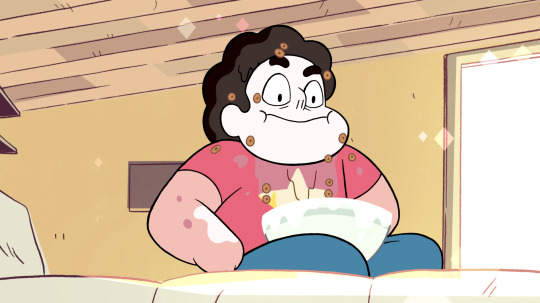
Ahah, I genuinely can’t tell if this is Steven being gullible, or just impulsively playing along with Amethyst’s antics. Still- gross, kid. Don’t wipe your wet cereal face on your shirt! Ew! :O
When he goes outside and starts to use a kiddy metal detector to scan for quarters... so THAT’S where he finds his arcade money! Because I can’t imagine Greg is financially able to give him that much to spend on non-essentials at this point in the show.
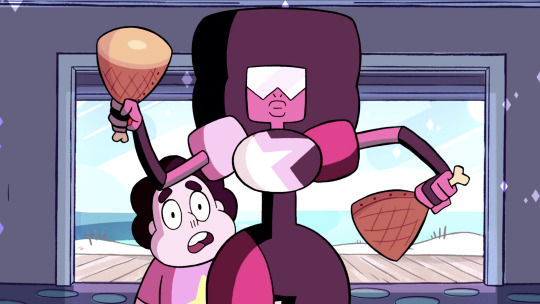
Okay, so... I just want to bring light to the fact that Garnet has literally been in this arcade ALL NIGHT LONG.
It was evening when she first arrived here- the sun was visibly setting in the background, and when Steven, Amethyst, and Pearl left, the sky was dark. But now it’s morning. Steven was just seen eating breakfast. And Garnet is STILL HERE.
Does this mean Mr. Smiley locked her IN? I have so many questions... Did he try to get her to leave, only to be intimidated by her complete lack of response? I would kill to know more about this interaction. Poor Mr. Smiley. That man deals with so much bullshit in this town, huh?
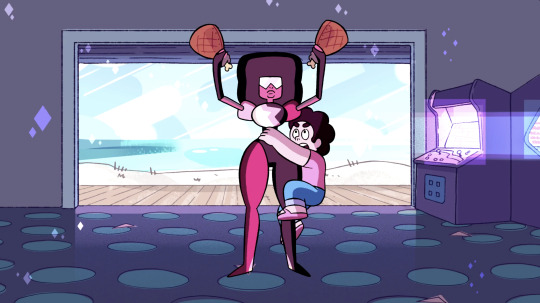
Geebus, is Garnet a solid wall. Previous episodes have shown Steven forcibly shoving whole tons of food, and swinging a mini-freezer over his head, and yet he can’t get her to budge even an inch.
I absolutely adore how he climbs up her frame like a koala, though, ahah. Cute.
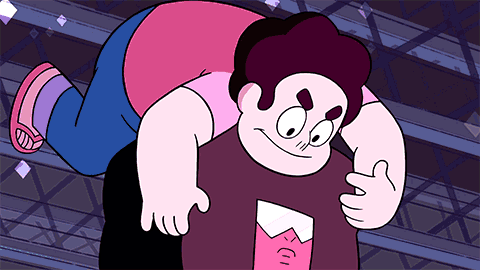
Meat Beat Mania announcer: “That’s rare!!” Steven: “Oh my gosh...!”
I take these two lines as evidence that this is the first time Steven’s ever seen Garnet’s eyes. Specifically, the fact that there’s three of them. Which, makes sense- since Garnet is still really reserved emotionally at this point, and is only begins to get in the habit of taking her visor off to show Steven her full face later on in the show.
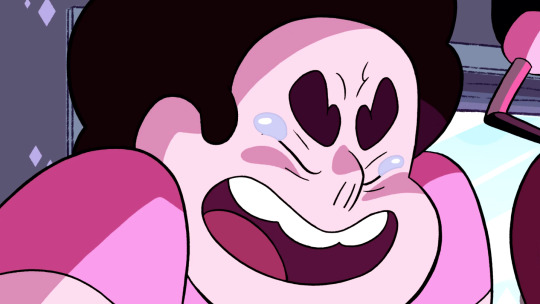
This expression deeply hurts me.
Steven’s so distraught here- because the others are in danger, the town is in danger, and he doesn’t have his trusty, dependable guardian who catches him when he falls and beats up scary monsters for him. Without her, the whole team is vulnerable and blind.
He feels alone. He feels... powerless.
And so he responds to that confusing, powerless feeling by trying to compensate with his own power. When all other routes he can think of fail, he smashes the video game console.
It... uh, it works... but once again, Steven entirely fails to consider the consequences, huh? He experienced a little bit of character growth in this regard in the episode Serious Steven, but even past that it’ll remain an recurring issue for him. Hell, his impulsiveness is a general character flaw even stretching into SUF.
In summary, though:
Poor Mr. Smiley. He works so hard, and doesn’t deserve this BS. ;-;
121 notes
·
View notes
Text
SO I know I’m like, super late to the party, but I finally got my hands on Robin 2021 and there is literally no one for me to talk to about it so now I’m just screaming my thoughts into the void ✌
First off, before i even bought the first two issues, I read through a lot of other people’s opinions on it to kinda get an idea of where it was going characterization-wise for Damian, and because of all the mixed reactions, I figured I should just read it myself and find out. Now I am the FURTHEST thing from a comic book authority, so like, this is truly just an opinion piece but if it convinces anyone to give the run a chance, then yay!!! Honestly, I’m really glad I gave it a shot because I’m genuinely hooked! I’m actually excited about this series (and it scares me lol)!!!
I'm gonna separate my thoughts into two sections: characters, and story, mainly for my own ease, but also if anyone cares more about one thing or the other it's easier to distinguish. But, the line is a little blurry so if I end up getting a little too much into the characterization in the story section, just bear with me lmao. OH and I'm going to try and keep this as un-spoilery as possible but we'll just have to see. SOOOOOOOO
Characters
I think it goes without saying that Melnikov's art is absolutely gorgeous, and really does show how much Damian has grown up. It makes me want to sob its so beautiful, everyone is so pretty, even the guy that looks like a washed up, high as fuck Tony Stark lmao. But moving on to the actual characters,
Rose Wilson
I honestly don't know too much about Rose, I haven't read enough about her to say anything about her characterization and how it compares to her other appearances, or whether or not she is OOC, but so far, I'm enjoying her taking up the "big sis" role, like, immediately lmao.
I don't know how much I trust her yet, but I definitely get the vibe that even if she does betray Dami in any way, she's probably gonna stick her neck out for Dami again and he's probably gonna do the same.
I'm really intrigued about her motivations for being here. Obviously, Respawn has something to do with it, but I want to know what's up with that. I've seen a lot of theories and I'm so excited. Also side note, that Black Swan chick is hot, and I can't wait to see more of her in action!!!
I feel like Ravager knows a WHOLE lot more than Dami does about the interesting things going on on the island, mainly because she's been doing a lot more sitting and waiting than he has as of yet, but I'm hoping to see more of the two of them doing detective-y sleuthing together. We love a mysteryyyy
Flatline
Okay but real talk, why does she look like a character straight out of Monster High
Honestly tho, I dig it. It's cute! She's cute! She isn't annoying (yet) but I don't know if I care too much about her other than she would make a cute friend for Dami.
I think the problem with DC is that they know people LOVE Harley Quinn and they try so hard to make characters just like her but it always falls short, so honestly I am a little wary of her character development in this run, but I'm willing to give her a shot since her little coffin purse on the cover of the second issue is so damn cute. I'm a slut for character design, okay?
Oh speaking of Flatline and Dami, I don't ship it and I don't want them to force a romantic relationship into Damian's "coming of age"/"soul-searching" moment okay? Because that's what this run is about, at least to me! More on that in the story section!
They're literally 13/14 years old. That's 8th-9th grade, babes lets think about that for a minute
Also let's stop the whole "lets introduce a female character just to make her a love interest!" bullshit okay?
Basically, Flatline is interesting, or at least has the potential to be, but I don't want to get my hopes up because DC is notorious for disservicing their female characters 😕
I think the mixed reaction to her is valid, I don't think she's had much time to make a solid impression yet, so I guess you'd have to read it for yourself. Personally, I don't understand why people immediately hate her, especially because she's like, 14, and what kid that age isn't annoying? like at least a little bit lmao! But, yeah. I don't trust her either but literally everyone on this island is sketchy at least and a murderer at best, so hey 🤷♀️
Damian
His new outfit lmaoooo at first I was like "WHaT is this child wearing? You'd think Dick would have rubbed off on him and taught him what good taste looks like" but then I saw the later outfit, with the gold patterning and those sleeeevessssss ugh and I take it all back. A Fashion Icon TM. Truly stunning. A sight to behold. So proud, look at him go 😪
I think there's a lot of different opinions on Damian's characterization in this run, and I can definitely see where its coming from, but I disagree with the notion that Damian has been done dirty and reverted to a blood-thirsty, feral child. And I have a LOT of opinions on the whole "feral" thing regarding Damian period (but that's for another time).
I don't think of Dami's rampage as a regression for his character. He's letting of emotions right then and I think its very similar to him venting. Its just not verbal, its physical and he knows he's not going to have to grapple with the consequences of his actions on the first kill. He knows he's technically not doing anything wrong.
He is clearly upset at Bruce and his failure to protect Alfred, and while Dami and Bruce are really often described as being very similar personality-wise, they are still distinctly different individuals who came to their current moral codes in vastly different ways. Bruce came to his "no killing" rule on his own; he made that decision for himself. It wasn't taught to him, it was a moment-of-truth kind of situation. Damian, on the other hand is in a vastly different situation.
Dami is, I think, at the beginning of the climb to his own moment-of-truth. He is in his rebellious phase like Dick, where he's gone off to spread his wings. It's not his conscious intention (at least that's not the vibe I got from reading the first two issues), but its directly underlying his "mission".
Damian is growing out of the expectations of his parents and into his own person. We all know he's been thrown from one moral code to another, both drastically different from each other. I don't think its a regression for him to lose his way a little, because realistically, he's going to have to in order to find it, specifically a moral compass that he forged on his own. He's just what? 14? Like hell a kid his age wants to listen to any form of authority. He's as stubborn as it comes. Damian needs to come to his decision regarding the path he takes in life on his own. It can't be made for him. He's seen and lived both sides of the coin, and I don't think he should be forced just yet to choose a side or pave a middle ground, but I do think that he should get the opportunity to see and experience all the gray areas on his own.
I think I'll transition from characterization to story here, because let's face it, this story is about Damian dealing with his confused emotions right now, in the wake of losing Alfred, a man that kind of acted like a grounding presence, a voice of reason, or a moral compass for him (and honestly Bruce and the rest of the bat crew if we're honest).
Story
So there's a lottttt going on in the story that is really enticing and exciting, and I'm really interested to see how it all plays out.
All the rules to the tournament are so, sketchy? Like they don't sound like they are meant to be sketchy, its basic safety and guidelines or whatever but with all the glowy green shit and the stakes of the tournament? Yeah, you can bet your ass its the "no fighting at night" and other shit is gonna be broken, and that's likely when the fun begins *insert evil laughter*😈
I was slightly put off by the whole "let me teach you to have fun" thing with Rose, because it's not like Dick, Steph, Jon, and like the Titans haven't done that with him too, but eh, not something I'm too concerned about. It's definitely just a segway to get us introduced to more characters that might become Damian's friends which will be interesting considering what Mother Soul said about fraternizing.
And that's another thing! I want Damian to make some friends! I know he already has some, but here's the thing: I think he's already been struggling with belonging, and he's definitely been feeling the disconnect between his life and other kids', whether they're supers/vigilantes or not. I think it'd be nice to see Dami have the experience of meeting people who he at first thinks are just like him!! and then realizing that maybe he doesn't really fit in here either, and that it's okay to feel like you don't belong, as isolating as it may feel at times. It just means you have a set of values. I want him to realize that its not always a bad thing, and you learn more about yourself and your own heart this way.
And from there,,, lets talk about the thing that stuck out to me the most in these two issues! GUILT!! It's mentioned SOO many times already, and I think its going to be a really fun, heartbreaking, and interesting aspect to explore about Damian. Is it guilt about his actions? Leaving behind family? Not being able to save Alfred? Not being a perfect example of Robin? He may call himself Robin but he doesn't sport the OG look or symbol like before. I love that his guilt takes on the form of Alfred though, or at least his conscious. I think it'd be really interesting to see this conscious disappear when Dami strays too far from his center, and when he finds it again, it reappears.
I really think that seeing Damian's actions in this run as a failure of character development is an unfair assessment, though. You can't do everything right in order to grow! You have to screw up, lose your way, experiment with life to find your fit, right?
Something tells me he doesn’t care for the tournament itself, but the end result, and the people behind it and more about WHY it was hidden from him. I mean he finds out the tournament TRULY begins once everyone has died once and tHEN he kill everyone? Felt to me less like a “killing spree” as everyone put it to a calculated decision to get the tournament going. He literally cuts Mother Soul off in the middle of her speaking to start fighting at the beginning
Anyway, just my thoughts lol. I do have some issues with the past two issues, and I might make a separate post about that, but honestly not enough for me to dislike Robin 2021 so far. I mean, besides the very obvious white-washing in the second issue, because DC can absolutely do better. And they should. It’s like they thought we wouldn’t notice???? But besides that, story and characterization-wise I’m looking forward to more. Here’s to hoping it stays that way, just with a better colorist!
20 notes
·
View notes
Note
I get where you’re coming from, but I also don’t understand why you keep bringing up the “let the characters suck!” thing when it’s clearly not what RT intends. RWBY+=always right, everyone else=always wrong. Wham-bam-thank-you-ma’am. Like, for fuck sakes they make the characters who are supposed to liked hated and who are, at very least, wrong liked. Did Clover ever piss you off? He didn’t me, even when he was making the “mistake” of not immediately trusting a teenaged girl he just met.
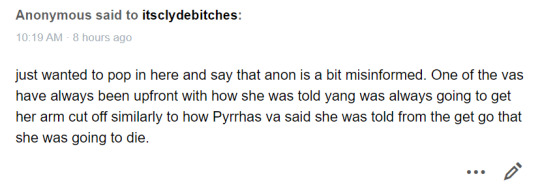
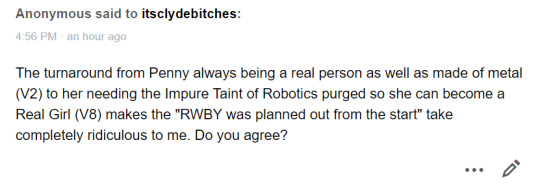
Throwing these three anons together!
First, it’s more about having a theory than being misinformed - “I theorize that...” is how that previous anon phrased the asks. Whether they knew about the supplementary material discussing Yang’s arm isn’t the point. The point is that, despite being told “This was planned,” we’re faced with all these discrepancies in how that plan was executed and one way to explain that is to go, “Maybe it wasn’t planned.” To be clear, I don’t mean that as an accusation, that RT is straight up lying to their audience (even though, as a company, there is something to be said for the tendency to spin everything into the best light possible). Rather, there are lots of different ways to interpret “It was planned” or even “It was planned from the start.” Using Yang’s arm as the example, what was planned? That she would lose her arm at some point during the series? That she would lose it specifically during the Fall of Beacon? That she would lose it to Adam? That is would start a multi-volume PTSD arc? I’ve mentioned elsewhere in regards to Ironwood that “It was planned” doesn’t tell us how detailed that plan was, when it would be implemented, or even when the plan was formed. They planned to have Maria and Penny arrive in the story earlier, but that obviously didn’t happen, so how many other plans have been heavily modified? And in long running series written by multiple authors over the years, it can be easy to frame an idea as a plan. Were they really writing Ironwood to eventually become a bomber back in Volume 2, or did they just have the idea that he might become a bad guy, with no solid understanding of when that would happen and how? Were they really writing Yang with the knowledge that she was heading towards this specific trauma and recovery, or was it a broader idea that might have come about in any number of ways? “It was planned” is a pretty nebulous statement on its own, even more-so in a series with a lost creator and a revolving crew of writers. For every “Pyrrha’s VA was told that she’d die” with the implication “They know what they’re doing” attached, there’s a “Ironwood’s VA had no idea his character had a semblance and had to find out through a fan” with the implication, “They don’t.” Penny is another example of this where yes, some fans think it was planned because of the Pinocchio inspiration, but that falls apart in the face of the number of characters who don’t follow their original character arcs, the fact that we already had a Blue Fairy stand-in confirm Penny’s realness (Fria), and that this flies in the face of seven seasons worth of thematic messages. So it comes down to execution. Either RWBY isn’t planned like RT says and they’re not able to write a compelling, consistent story on the fly, or it is and they’re still not able to accurately present the what they’re after on screen.
So the critique isn’t so much about whether RT is planning or not (though that’s still a legitimate question: Do you know what you’re doing with the Relics? With Salem? How this story will end?), but the fact that their execution is severely lacking. Ultimately, it doesn’t matter whether Yang’s arm was planned or not because we’re still left with this issue of why what she’s learned as a result of that tragedy has been tossed out the window. None of us will ever be able to prove, beyond a shadow of a doubt, what exactly was planned and to what extent, but focusing on that becomes an easy way to shut down the discussion. The underlying purpose behind the previous anon’s thoughts wasn’t so much to prove that Yang losing her arm wasn’t planned, it was to try and find a way to explain these writing problems: Why has she regressed? Why wasn’t Adam’s history explored? Why was the recovery arc so shaky in places? Questioning whether this was actually intentional is one way of explaining why these problems exist despite a supposed plan. Maybe the plan doesn’t exist, despite claims otherwise. Or maybe our understanding of a plan is very different from RT’s. But going, “it was planned” carries with it the implication that, because there was planning in place (taking that at face value), there’s no longer a problem. It dismisses the critique at the heart of the theory. Another fan wrote on the same post, “Yeah no this is wrong. She was supposed to lose her arm from the start” and... that’s it. That’s the conversation. Rather than engaging with these problems, “it was planned” is used as a catch-all explanation for why the writing supposedly isn’t bad. Yang’s arm was planned. Pyrrha’s death was planned. The bees are planned. The Fall was planned. Ozpin’s history was planned. This fight was planned... and because it was all planned, you have no right to criticize how that plan was executed, let alone challenge whether it was actually planned in the manner RT implies it was.
Never mind that, if all of this was planned to a T, that just makes things worse. The assumption of planning throws all these contradictions, mistakes, backtracks, and confusing choices into a far harsher light. Considering that RWBY is perhaps not planned in the way RT would like us to believe it is results in the understanding of, “Oh, well then no wonder things are a bit of a mess. They’re figuring it out as they go, dropping, erasing, and rushing into ideas along the way.” Meanwhile, pushing the idea of a perfectly planned story results in, “Oh, so... you've known this would happen for years and still didn’t manage to lead up to it well, keep the facts straight, or follow up on the event in a satisfactory manner?” Given how many problems RWBY has atm, RT shouldn’t want the audience to think this was all planned because that invites a far more critical look at their writing choices than an author who goes, “Yeah, we didn’t know we were going with this until the season it was written, so it’s a bit rushed in places. Sorry, we’re working on that.”
As for why I care about letting the characters suck at times, that’s because allowing for such basic characterization would go a long way towards resolving the execution issue. This insistence on making Ruby’s group morally perfect - that intention - is likewise making the authors blind to all the problems this creates. Clover is a great example. In order to make the heroes out to be perfect, Clover becomes the bad guy... despite not having done any work in the previous volume to show that. The authors apparently can’t see that discrepancy, or they simply don’t care about it. Allowing all the characters to make mistakes and grow from them would free up the other characters to be more consistent. If Ruby was allowed to be flawed then there’d be no need to make Clover one of her many (supposed) contrasts and no contrast means no retconning of his personality. These problems in the writing are interconnected. The insistence on “Team RWBY is perfect no matter what” encourages the authors to ignore when their execution is lacking - such as, say, suddenly having Yang no longer frustrated with Ruby’s leadership - and that lack of execution in turn makes it impossible to believe the “Team RWBY is perfect no matter what” claim - the story has shown me how flawed they are, so... why aren’t we acknowledging that? The fandom’s focus on, “It was planned from the beginning! They have Monty’s notes!” ignores that whether it was planned or not, there are serious problems in how these ideas are implemented, hindered by a black and white morality in a show that simultaneously wants to be gray. Part of why the execution is so lacking is because what’s been introduced in the past is inevitably tossed aside for the “Ruby is right” ending and that past writing includes what may or may not have been planned.
21 notes
·
View notes
Text
Tangled Salt Marathon - Rapunzeltopia

This episode, much like many other plot important episodes of the first two seasons, is decent on it its own, but becomes retroactively worse due to season three’s bad writing and behind the scenes bullshit.
Summary: Matthews reveals himself as another dark spirit and disciple of Zhan Tiri, and traps Eugene, Lance and the others in unbreakable vines similar to the Great Tree's evil magic. He has Rapunzel live the perfect life while he prepares to hand over the mystical powers of the Sundrop to his master. Fortunately, Rapunzel is able to make contact with her brown-haired dream self and attempts to convince her to let go.
Timeline Alert
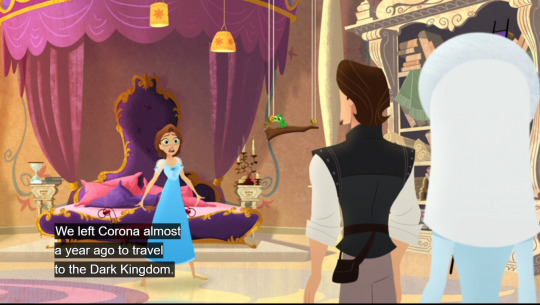
So what does almost a year ago mean? The Great Tree was six months out, and then in Mirror, Mirror, Lance said that they been fighting for three weeks since. So how long have then been stuck in this shell house? Because You’re Kidding Me was just the next day after Mirror, Mirror. Was Lance’s ‘three weeks’ comment meant to be after Brothers Hooks and Rapunzel: Day One and not Great Tree? Are we 7, 8, 9, or 10 months out from Secret of the Sundrop? Like be clear about your time frame guys if you’re going to use it as a plot point.
I’m going to say we are 9 months along on this trip, just cause that sounds closer to ‘almost a year ago’ without keeping them all trapped in the shell house for months. So Great Tree is 6 months, Brother’s Hook and Rapunzel Day One is 7 months, Mirror, Mirror is going on 8 months, and at the end of this episode they’ll be heading into the 9 month period...I guess. Lets just say they were trapped there for a week or two.
This Episode Only Highlights How Self Centered and Immature Rapunzel Still Is Rather Than Showcase How Much She’s Grown

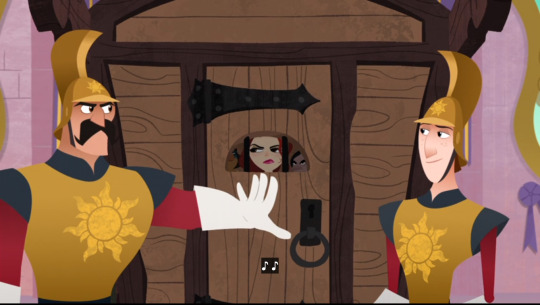
The point behind this episode is show how much Rapunzel has grown since season one, and how she is accepting of responsibility now, but it actually backfires because she’s not actually being challenged on her selfish desires but on her lack of agency. Which is the wrong lesson that she needs to be learning at this point in her development.
Rapunzel in her subconscious mind doesn’t wish for what’s best for other people but what’s best for herself. People she must interact with on the regular have to be superficially happy even if it completely warps their character. While people she doesn't care about, like Lady Caine, can just be simply banished and ignored regardless if they deserve such an end or not. She doesn’t see people as people with individual thoughts and feelings, but as satellites to herself and her narrow worldview.
Also, ‘I believe everyone deserves a second chance’ my eye! Caine never gets even a first chance in Rapunzel’s own fantasy world. Because Rapunzel is a selfish hypocrite who’s ‘redemptions’ always comes with strings attached.
Here Comes the Dumbest Plot Point In the Show
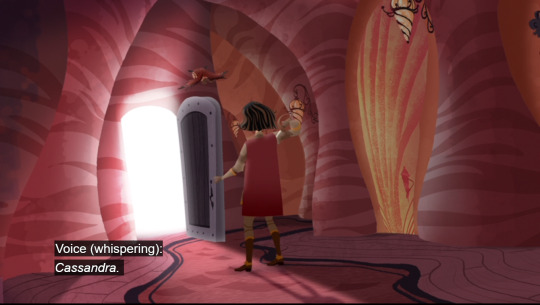
I’ll talk about this more when we get to season three, but this scene is the beginning of the end for any dignity the show once held.
Also why would ‘I don’t trust anyone’ Cassandra follow a creepy voice calling her name through a doorway inside a magic house that’s tried to kill her twice now?
If you gotta make you character act out of character in order to get your plot rolling than you haven’t a good plot. Think of something else.
What’s the Point of Having Two Names?

They did this both with Sugarbee and Matthews here and it makes zero sense. Why would they need to bother with fake names if the heroes wouldn’t even recognize their real names to begin with? Such revelations add nothing and fails to tell the audience anything new about the characters. It’s also not consistent as it turns out Gothel was a disciple too and she only gets one name, so what gives?
So How Does This All Work Again?
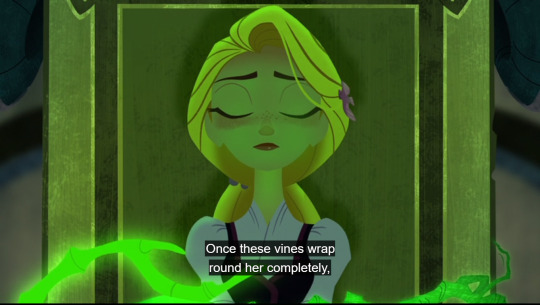

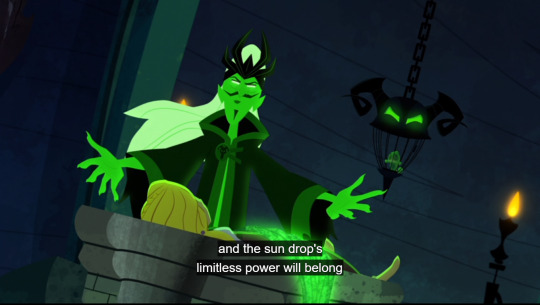
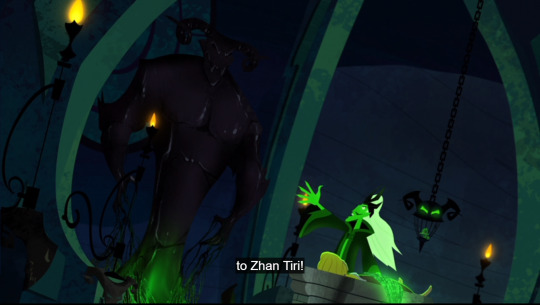
So Zhan Tiri needs ‘a clash of the sundrop and moonstone’ in order to be freed from her prison. Why? I don’t know, but holding Rapunzel prisoner for life actually undermines that plan, and it’s a plan that Zhan Tiri is currently setting up with Cassandra off screen during all of this.
So does Tromus/Matthews just not know that Zhan Tiri is already ‘free’ and has her own plans?
Is Rapunzel’s power being drained what gives Zhan Tiri a foothold in the real world?
Or was Zhan Tiri released back in the Great Tree with the removal of the spear and that’s why she knows to go after Cass?
What was up with the Great Tree and the sealed tree back in Painter’s Block? Did they have any impact on Zhan Tiri’s plans?
Were any of the disciples actually useful at all?
So What Do the Disciples Gain From All This?
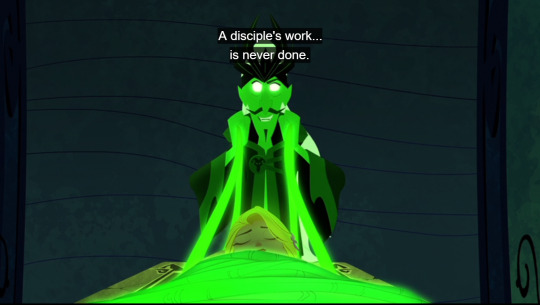
Sugarbee, Matthews, and Gothel were all once real people who actually lived so what are their reasons for following Zhan Tiri? What do they gain from going through such complicated plans? Why continue to follow someone after you’ve been dead for centuries and are a ghost now, and were presumably trapped and or killed by Demantius for following her? Real people don’t just hold on to such fanatical devotion without reason.
This Conflict Over Choices Does Not Work Without Varian

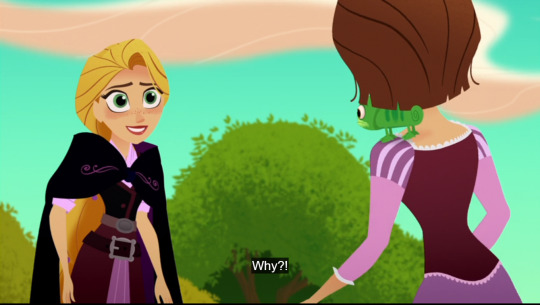
Going back to how this episode fails to develop Rapunzel; it wants to have Rapunzel take responsibility for difficult choices, but much like Painters Block, it completely ignores her biggest fuck up thereby undermining why she has trouble with owning up to hard choices.
Rapunzel ruined a child’s life. She may not have meant to but she did, and thus far she has done nothing to make amends for it. She’s not even spared the poor boy a single thought beyond seeing him as the boogeyman in a nightmare once.
You can’t have Rapunzel take responsibility for anything if you won’t hold her accountable for anything.
Varian was meant to appear in this episode, and indeed he should have for the above reason.

But of course Chris had to give us a bullshit excuse for why he cut the most plot important character from the series.

I’ve already spoken about how Varian’s cameo in Happiness Is did nothing to actually further develop Rapunzel nor explore her guilt back in that review. In this episode, however, I want to discuss how hollow the comparisons to Gothel is and why there shouldn’t logically have been any competition between the two.
Varian and Gothel provide two completely different conflicts and two completely different points of development for Rapunzel’s arc. Gothel is the instigator of her conflict with Rapunzel. Rapunzel, as the victim, has only one thing to learn, self esteem. She learned it back in the movie, she relearned it back in the season one, and here she’s re-contextualizing it for this episode’s mini-arc.
Meanwhile Rapunzel is the instigator of her conflict with Varian. She’s the one with the power in their relationship and her choices matter. She doesn’t need to learn agency because she already has it. What she needs to learn is responsibility and she can’t do that without confronting Varian and what she did in some manner. So unlike with Gothel there only new ground to cover here rather than rehashing old conflicts.
Chris Sonnenburg has things all backwards. Rapunzel’s agency/self-esteem issues and her need to take responsibility for her actions are not interchangeable conflicts. Addressing one does not automatically address the other, and of the two her conflict with responsibility holds more weight because it’s ongoing. We haven’t seen the resolvement there. It also affects more people than just herself so the stakes are higher there as well. And to top it all off, it fits with the themes of the episode better.
Also, you very much could have had both characters because they both reflect different conflicts and serve different purposes in the narrative. Time management in television is a very big deal yes, but you have little grounds for defense when all you’ve shown is how poorly you’ve managed your time until now.
In short, Chris is full of shit.
No, It Wouldn’t

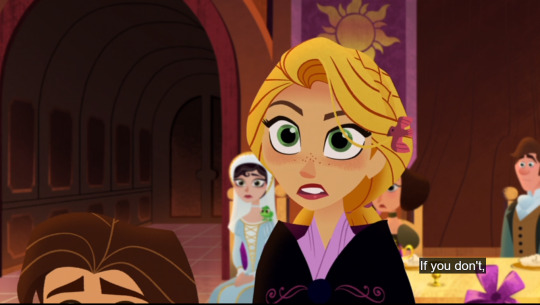
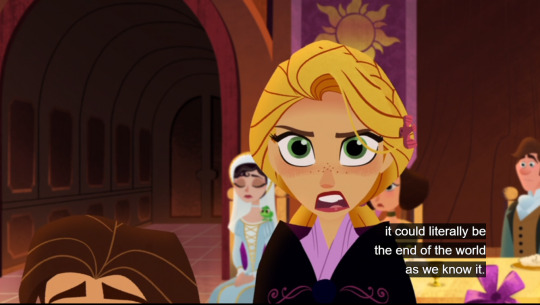
We’ve already established that there’s no need for Rapunzel to go on her quest in season two. The black rocks are inactive, there’s no ticking clock she has to beat, and her staying at home would have actually prevented the conflicts in season three.
Unless dream Rapunzel is referring to Zhan Tiri being released, but even that is false because Zhan Tiri is already floating around a little blue ghost girl off screen right now. What Rapunzel choses or chooses not to do does not change that.
Lack of external conflict undermines internal conflict.
Just Cause You Make A Meta Joke About Your Heroes Being Dumb For No Reason, Does Not Make Them Any Less Stupid
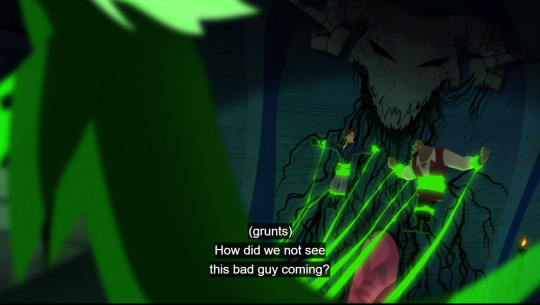

Jokingly admitting a fault in your writing doesn’t not excuse that fault. If you can’t have a plot without handing the idiot ball to your characters than you haven’t a good plot. Time to go back to drawing board.
Season Three Will Go Back On This Episode’s Message and Prove the Villian Right
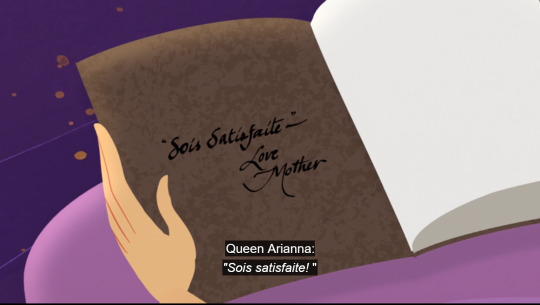
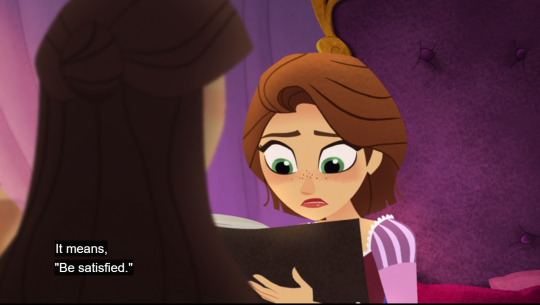
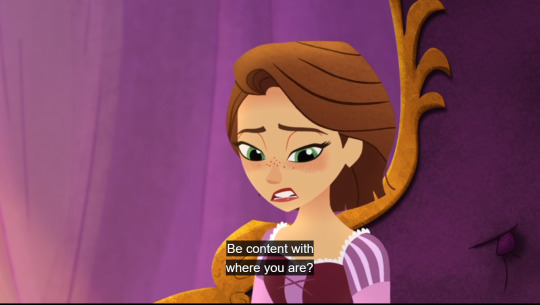

I’ve liget seen fans unironically praise the show for it’s message of ‘be content with what you have’. Not only is that a terrible lesson to teach children; it’s actually the exact opposite of what the show is trying to achieve.
“Be satisfied” is suppose to be the wrong motto. Rapunzel is suppose to be fighting against this message. In the episode itself it’s the villian who is saying such things in order to tempt her to stay put.
So how could anyone look at the show as a whole and come away with idea that the one off villain was right along?
Because season three does a complete 180 away from its original messages regarding agency and responsibility. All consequences disappear from the story and the mains are given convenient scapegoats to distract from their decisions. Characters actively regress and are rewarded by the narrative for either not doing anything or for victim blaming others for their actions.
But most damaging of all is the fact that nearly everyone winds up back where they started out at, or aren’t given a proper ending at all. Tangled’s story is just one giant circle and that in of itself contradicts the idea of progress.
Cassandra’s Hurt Hand Is Only Relevant When The Story Wants Rapunzel to Feel Guilty About Something


Oh but we can just throw Cassandra’s burnt hand in here as a substitute Rapunzel’s guilt over Varian. Even though the two incidents should actually complement one another rather than compete for dominance.
Tangled doesn’t trust its audience to remember things. It acts like if it’s off screen or not being focused upon than it’s not happening or isn’t relevant. This undermines any ongoing or overarching conflicts.
Why should we care about Cassandra’s arm if she’s been shown as being fine with it for four episodes by now? Especially since it’ll never come up again after this point? And on the flip side of things, why should the audience not care about the 15 year old who has been sitting in a dungeon for almost a year now due to Rapunzel’s neglect?
We’re not magpies who are quickly distracted by shiny new things. We are capable of retaining information and informing decisions based off of that. Especially if Chris was shooting for the teen audience as he claims he was.
Oh But We Got Time For Godzilla-Pascal

Can’t spare even half a minute for a Varian cameo that would be relevant, but we sure got time to waste on a pointless action sequence that does nothing to further the character in what is meant to be a character development episode.
This Scene Is Out of Character


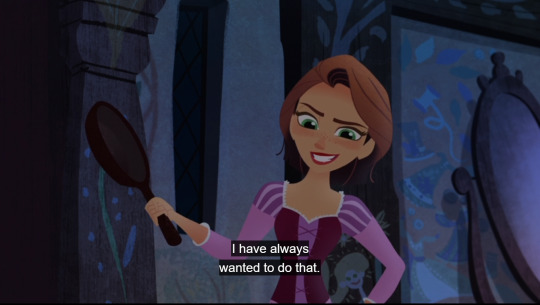
That’s not how abuse works!
The whole reason why Gothel was able to keep Rapunzel under her thumb for 18 years because Rapunzel always sought her approval. Never at any point, even when finally choosing to break away from her in the movie, did Rapunzel wish to harm the woman. That goes against who she is as a character and it’s not how abuse victims respond to abusers even after cutting things off with them.
If anything, Rapunzel’s treatment of Frederic in Happiness Is is more in line with how a victim goes about mourning the loss of an abusive relationship. Victims grieve for what might have been. Victims mourn the loss of what good times they had with their abusers, because yes, abusers aren’t abusive 100% of the time 24/7. They can’t be or they risk losing their victim quicker.
I initially was ok with flashbacks to Gothel on occasion because no victim ever makes a completely clean break from their abuser. Even ‘moving on’ isn’t some triumphant singular action when you stand tall while you knock your opponent down in a wish fulfilment fantasy.
No. ‘Moving on’ is slow. It’s understated. It’s routine. It’s about being able to do the dishes without getting triggered. It’s sitting at lunch with friends and being happy and calm without the fear of returning home hanging over your head. It’s not skipping out on work because your anxiety is through the roof over just meeting with your boss. It’s not devolving into a yelling match over something minor because you internalize your abusers behavior.
Abuse victims don’t celebrate violence as strength. We celebrate being an unmovable mountain of clam fortitude. Being in control even as the world rages at us, because we’re self assured.
The fact that this scene exists, while Happiness Is shows Rapunzel behaving the opposite way to the father who abused her the same as Gothel did, only proves that a man shouldn’t have been in charge of this show. Certainly not without a woman by his side giving equal input.
Stop Using Destiny as a Shorthand for Everything!
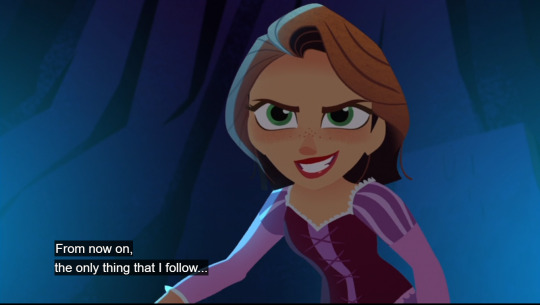
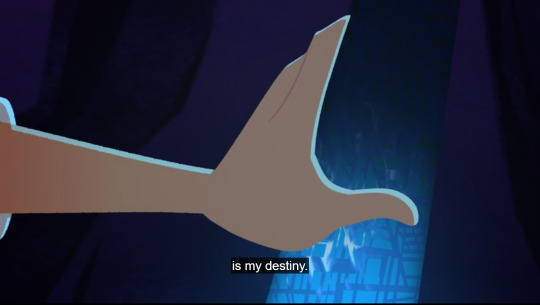

Destiny isn’t a catch all word that can mean whatever you want it to. Words have definitions for a reason. Destiny isn’t a goal nor does it equate to agency and responsibility; kind of the opposite in fact.
Well That Was Redundant

All we did was rehash Rapunzel’s season one arc in under half in hour. Nothing new was learned. It’s like writers don’t know how to resolve any conflict that isn’t a repeat of the first movie. Meanwhile actual unique conflicts are just sitting off to the side being ignored. All because the show’s creator doesn’t want to hold his precious self insert accountable for anything.
Bye Bye Smart Cass, Hello Dumb Cass
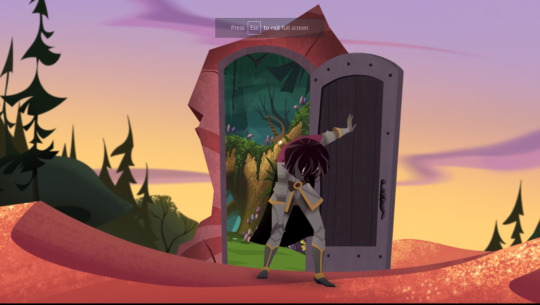
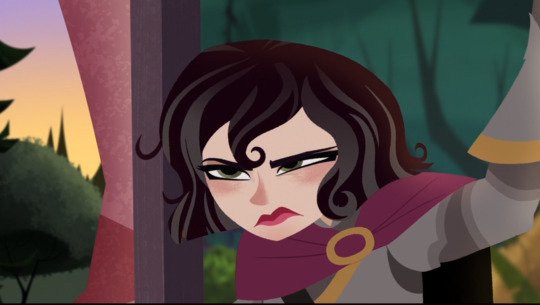
So from this point onward the Cass we’ve known for nearly two seasons is gone. She’s just been replaced by the dumbest bitch on the planet. Because the writers don’t understand how manipulation and trauma actually works. Nor do they comprehend the importance of giving characters actual goals.
Conclusion
Season three is what retroactively spoils this episode. Cass’s dumb decision here, Zhan Tiri’s lack of a coherent plan, the uselessness of the disciples, and even the lack of Varian could have been glossed over had they writers given us a satisfying pay offs for any of the main conflicts. But they didn’t and so here we are.
Also a small update, but after this review and starting next week, the Salt Marathon will go from bi weekly updates to only one a week. This is a combination of real life work getting in the way and the growing length of the reviews. This means we’ll hopefully be done come March, which would mark the show’s anniversary. I got some plans to celebrate if that works out.
84 notes
·
View notes
Text
During the Neon Genesis Evangelion rewatch I decided pick an aspect of the show to focus on as I watched, and I chose Misato; namely, how her arc connects to Eva’s wider themes. Evangelion has a lot going on and I don’t think it can be boiled down to one thematic concept, but if I were to try: real fulfillment for people can only come from being of value to and connecting with other people, but as an individual that process is inherently painful and impossible to truly achieve - What Do? Shinji embodies this in a very interiorized (and therefore very universally applicable) way, withdrawing from others and neglecting his potential to act out of fear of the pain and consequences. Yet one of the really interesting things about Eva is how the other characters reflect a different aspect of this same struggle, and so all combine into a grander narrative.
Misato does this as well - but in a way that doesn't jump out as much. Misato is very much the driver of the plot, making proactive choices around the conspiracy, the war, etc, and these actions can often overshadow her inner struggles. Thus, singling her out for focus - and from that process I feel she showcases a really unique take on the show’s themes.
Reflections on Misato’s Thematic Reflection
The other three main characters (Shinji, Asuka, Rei - sorry Ritsuko fans!) being all kids, tend to struggle with issues very close to home, but Misato is the adult in the room and so has adult concerns, namely the big picture struggle for humanity. These concerns are her duty though, not her passion - Misato is riddled with “base” desires that are emotionally and physically hyper-indulgent. Her relationship with Kaji is a constant temptation to escape from those duties and instead whittle away endless time in emotional intimacy - and also fuck like rabbits. There is a great showcase scene in End of Evangelion of this, where in their youth Misato and Kaji literally spent a week straight in their apartment doing nothing else:

----For Misato, fans symbolize sex, which I love is a sentence I can say----
Note by the way that they could have communicated that they were cloistered off banging it out in a myriad of ways, but they chose to highlight the outside obligations Misato was neglecting to do the job, because ~*themes*~. But of course such states cannot last, and Kaji himself has his own duties, very similarly to Misato, ones that he will not truly neglect for her sake.
This arc is further reflected in her relationship with Shinji, who she adopts in the opening episodes as a sort of surrogate child. While the contradictions here are less evident at first, as the show progresses it becomes clear that this family is, to quote Ritsuko, “playing house”, a pantomime of adulthood over the reality. Furthermore, her desire to mother Shinji - a desire she holds strongly for reasons I’ll note soon - starts running up against her need to command Shinji as his superior officer, commands that increasingly hurt him but are for his (and humanity’s) own good. In both of these cases, Misato is torn between those outer responsibilities and inner desires, and has to walk a tightrope of balancing them.
Like so many in the the oh-so-Freudian Evangelion, Misato’s conflicts stem from her relationship with her father; a cold, neglectful man who was absent for much of her life growing up, but who was devoting his time to NERV (the core organization in the show) fighting for humanity in his own way and also sacrificed himself to save Misato’s life when she was a teen. She loathes him and idolizes him simultaneously for this duality, which expresses itself as an outer shell of heroic professionalism masking the inner vulnerability and desire for the intimacy she lacked growing up, alongside a deep shame of that desire:
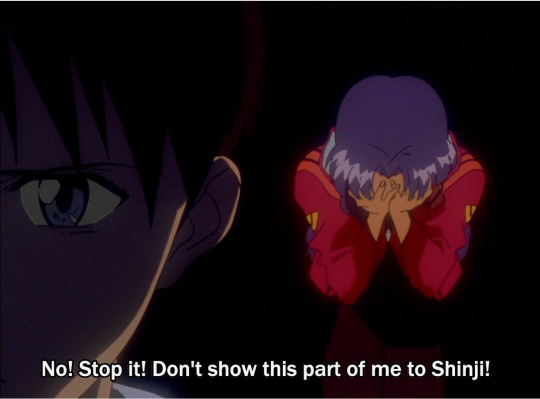
This shame is important, since I wager it would tempting to think that the conclusion of Misato’s arc is “always prioritize the big picture”, as that embodies her final moment: convincing and even *sexually manipulating* Shinji into piloting the Eva for the greater good. Its a powerful scene, and also a callback to the very first episode - where she stares on in horror as Gendo (her boss & Shinji’s absentee father) equally orders Shinji to “pilot the Eva” despite the terrible toll it would inflict on him. She judged it harshly then, but now is reprising that role under even more terrible stakes. I could see one concluding that Misato’s arc culminates in her embracing a Gendo-ian ruthlessness.
But it doesn’t, because A: Gendo is a selfish, cowardly piece of shit, not at all concerned with the greater good, and B: when Misato’s effort to Be The Adult are partially motivated by a desire to cover up for her shame in her damned sex drive, that *can’t* be fully aspirational! She was only able to get through to Shinji because of the emotional connection they shared, which stemmed from her desire to “play house”, a choice that itself stemmed from her desire to be *nothing like* her cold, absent father and not make the mistakes he made (told you we’d get there). And they *were* mistakes, despite her father’s intentions. If Evangelion has an answer to its question of “how to solve the pain of being part of society” (It does not, I am radically simplifying right now), it’s that you can’t solve it, to wipe that pain away (AKA Human Instrumentality) would be a mistake, and instead you have to accept the pain and contradictions as the key to how you evolve as a person. Misato changes over the course of the show, but never in a way to resolve these contradictions - she only evolves to cope with them.
And then she dies, but hey, its Shinji’s story in the end. Sometimes you gotta get Fridge’d for the greater good.
------
A final, sort-of side note to take this a little beyond Misato’s arc, “evolution” is critical to how Misato serves as a reflection of the theme for other characters. A huge crux of Shinji’s arc is his relationship with Asuka, namely his burgeoning romantic desire for her that he is incapable of acting on due to ~arc stuff. For Shinji, if he made a move on Asuka and got down with her it would be huge progress for him! Sex is a critical component of connecting with others after all, and it would mark his ability to open himself up to those connections. But what is progress for Shinji, the teen, is regression for Misato, the adult, as her sexual chemistry with Kaji can tip into excess - for her connecting with one person is in fact a form of withdraw from her wider responsibilities. What is the healthy choice for you constantly evolves as you yourself evolve, and its really fascinating that Evangelion simultaneously uses sexual intimacy for opposed meanings via different characters. The scene I posted above, where Shinji is judging a shame-filled Misato for the sex she is having, is one where both of their weaknesses are on full, simultaneous display - very hard for one scene to pull off.
------
(A final-final meta-note: I rarely write about themes in shows because I feel like everything I am saying is super-obvious; there is only so subtle a tv show can be. If you are going to do like cross-comparisons between shows or wider social trends that’s worth it, but just the show in isolation I fear it’s too basic. Would be curious if anyone who does stumble on this essay has that reaction of “yeah anyone who saw the show would know this”.)
129 notes
·
View notes
Text
Question: Why is Sora becoming a fashion designer perceived as a “non-empowered” or “non-feminist” choice, in 2020?
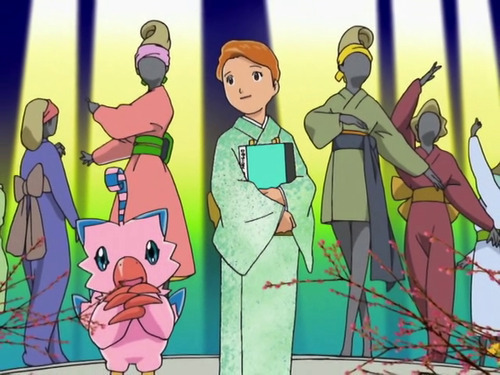
To begin with: this analysis isn’t about if Sora’s Epilogue career choice was foreshadowed or developed enough. That issue belongs in a more general discussion about why some fans felt dissatisfied with the Epilogue, in particular those jobs that were considered to be unexpected or more left-field.
It also isn’t about individual fans’ personal disappointment with the character’s trajectory. Obviously, there are many factors at play that could lead one to be unhappy with how Sora’s turned out — dub changes, the cultural background information that isn’t always evident, or just personal reasons. No-one needs to agree with Sora’s job or feel compelled to justify their personal dislike.
Nevertheless, I will propose the following four explanatory hypothesis for why people might harbor a negative view of Sora’s career choice:
1. Being a fashion designer goes against Sora’s previously-established personality, interests, and values. 2. Her future career isn’t empowering. 3. It’s regressive, because all the female characters just ended up with stereotypical, traditional feminine activities. 4. Sora stopped being a role model for gender non-conformity in girls.
In this post, I’m going to try and demystify those points of view, in order to try to show that Sora’s career is both fitting and empowering.
***
Hypothesis 1: Being a fashion designer goes against Sora’s previously-established personality, interests, and values.
I believe this perspective is more connected to a general misunderstanding or lack of appreciation for Sora’s character arc.
To make a generalizing statement, many fans felt frustrated when Sora went from being presented as not particularly “girly” (playing football, wearing more practical clothes, being friends with boys) to “suddenly” becoming more feminine post-Adventure (playing tennis, wearing more feminine clothes, being paired off romantically with a boy, doing ikebana). This “dramatic change” culminated in her in her becoming a fashion designer in the Epilogue.
Similar complaints exist about Miyako’s endgame. In both cases, dissatisfaction is based on the notion that a girl who doesn’t present as typically girly or has “masculine interests” in childhood wouldn’t gravitate towards “feminine things” later on. Some people believe that, in 02, becoming more traditionally feminine was associated with growing up and becoming more mature. Consequently, Sora and Miyako’s Epilogue jobs were a “correction” to their earlier presentation as young girls who challenged traditional gender roles.

While I think this is an understandable complaint, I must emphasize that a more deeper analysis of Sora’s character arc might help explain her trajectory in a more straightforward way.
Consider:
It’s clear that Sora is coded as not a "girly girl” in Adventure. Not only does she have a unisex name, but she is often presented as a contrast with the hyper-feminine Mimi.
Despite of this, I would argue that Sora was never portrayed as a full tomboy. For example, she speaks in a feminine way; her manners are delicate, even dainty; and she undertakes roles that involve being caring and nurturing, such as Big Sister / Group Mom — and, at one point, even damsel in distress —, which are normally associated with femininity. You never get the impression that Sora considers herself to be “one of the boys” or that she constantly struggles against gender expectations. Even her digimon partner is pink!
In Adventure, Sora’s preference for football over ikebana and annoyance when her mother asks her to act more “ladylike” are explained as a being a reaction against the pressure of Sora’s position as heiress to an old Ikebana family. To give the Cliff Notes version of the story: Sora rejected feminine as a way of rebelling against her mother’s perceived lack of love for her, and against the pressures of her position as ie-moto Crown Princess.
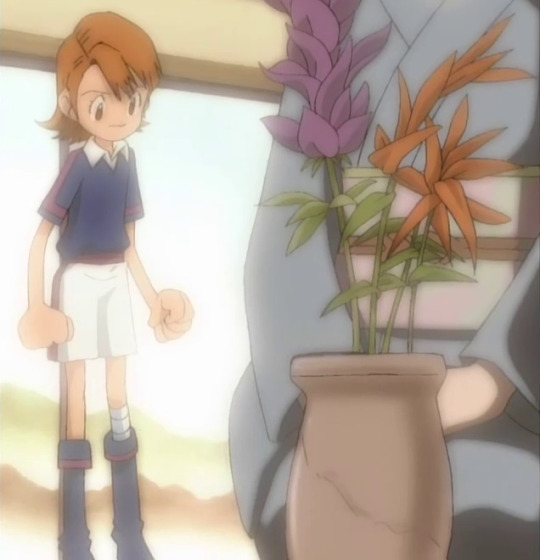
After Sora made up with her mum, she became more open-minded and gradually began to embrace and enjoy more feminine things, including tennis (it’s weird to me that people consider tennis “girly”, but I digress), cooking, and flower arrangement. As a teenager, Sora is also often seen wearing skirts and more feminine clothes, suggesting a more ‘womanly’ presentation, and she even ends up becoming romantically involved with a boy.
I don’t see any evidence in Adventure or 02 that Sora wouldn’t be fond of art, design, or fashion. On the contrary: she practices and enjoys flower arrangement. Sora’s hobbies and personality traits in Adventure and 02 include sports, flower arrangement, resourcefulness, responsibility, sensitivity, and an eye for detail. Is that really incompatible with a future career in fashion design? The fact that she comes from an Ikebana family directly influences her career choice, notably the fact that she uses traditional Japanese elements in her designs. This establishes a strong connection between her Epilogue Job and her arc.
TL;DR: Sora wasn’t really a tomboy to begin with, and her becoming “more feminine” as she grew up is explained in the series as being a direct consequence of her Adventure character arc.
*
Hypothesis 2: Her future career isn’t empowering.
I think this stems from from the belief that being a fashion designer isn’t an important enough career.
Since Sora is a Chosen Child, fans would expect grown-up Sora to be saving the world or being involved in Digimon issues, instead of doing silly things like making dresses and kimonos. After all, she is supposed to be a Strong Female Character™!
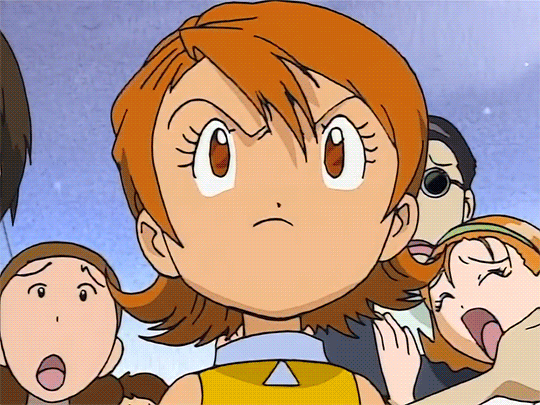
This point of view probably relates to the perception of creative professions — or anything related to art and culture — as “superficial”, “not serious” or “useless” for society. Fashion design, in particular ,is often seen as vapid or superficial, rather than a legitimate art form that can full of beauty and meaning. It’s the old story that if a career isn’t “powerful” or “useful”, then it’s less valid. (It’s interesting how no-one seems to question if becoming a footballer or a rock star would be “impactful” or “strong” enough for the two male protagonists.)
This might be also be tangentially connected to fans’ dissatisfaction with Sora’s decreasing importance in the team as the story goes on. Many people would have preferred to see her in a position of leadership, or in the front lines of the battle. In this sense, her career choice could be perceived as the writers sidelining this female character even further.
In short, Sora’s career isn’t baddass enough.
Counterpoints:
There are many reasons why Sora wouldn’t want to be involved in fighting as a grown up. I’ve written about it earlier, but I think nothing illustrates her choice better than the short film To Sora. While it’s fair to question to what extent this decision was linked to Sora’s increasingly smaller role in the team (meta-wise), it’s still based on established character motivations. Sora doesn’t work in digimon business because... she doesn’t want to.
Sora becoming a fashion designer is also a huge step for the character, in the sense that it means that she also does not end up taking over over as Ikebana grand-master. Instead, she forges her own independent path: she does something she wanted to do for herself.
Moreover, based on the little information we have, Sora either works on a relevant position or works in her own name, considering she is able to run fashion shows and make creative decisions. This means Sora isn’t just an artist with a vision: she’s in a position of power within the business.
We don’t have many clues to estimate how successful she is, but options range from her running her own small independent label, to being head-designer of a company, to becoming a proper superstar designer with her own successful global brand. All of those possibilities mean Sora has achieved considerable career success. If she’s doing some form of haute couture, then Sora’s arguably one the most “career accomplished” among the all group (if you use the usual questionable methods society uses to evaluate “accomplishment”, namely fame, power, and money).
And think of all the skills and talents necessary to be a successful fashion designer! Creativity; innovation; vision; diligence; hard work... to think of fashion design as an unimportant or “minor” profession is really reductive. Don’t you think icons like Valentino, Yves Saint-Laurent, Alexander McQueen, Coco Chanel, Vivienne Westwood, Hanaé Mori or Rei Kawakubo aren’t respected and influential? I’m not saying Sora’s at that level (yet) — I’m just saying she might be.
TL;DR: In the Epilogue, we learn that Sora followed her individual dreams and is triumphing in a challenging and important industry, producing high-quality art in her own terms. She even has the potential of becoming powerful, wealthy, and famous. She’s the definition of an empowered woman.
*
Hypothesis 3: It’s regressive, because all the female characters just ended up with stereotypical, traditional feminine activities.
This view is based on the observation that all the boys ended up with “important” careers, while the girls ended up with “feminine” jobs or, in Miyako’s case, not even a career at all. In other words, fans believe that the Digimon Epilogue wasn’t exactly good at providing progressive role models for girls.
I do have some issues with this view.
First: Isn’t the idea that traditional “feminine” activities are automatically lesser in itself sexist?
Why do we assume that a fashion designer or a school teacher is “less” than a writer or a doctor? I’m not saying the Digimon Epilogue is problem-free or that promotes gender equality (it is, after all, a Japanese children’s cartoon from 2000), but considering the reality of working women in Japan, is the Epilogue that bad and regressive?
(Also, there are twice more men in the team than women, so there’s more room for wider representation on the boys’ side. The four girls in Adventure always carry the burden of having to stand for half the population. As I mentioned in section 1, the fact that Sora was perceived as a “tomboy” means her career choice receives even more criticism.)
Second: Is being a fashion designer truly a “traditional feminine activity”?
I would argue that considering fashion designer (especially in the “higher ranks”) as “woman’s job” is both stereotypical (“clothes are a woman’s thing!") and historically inaccurate.
Here’s a fun fact: As of 2018, only 40% of womenswear fashion brands are designed by women and only 14% of the 50 major fashion brands are run by women.
Think of the most famous fashion houses you know; you’ll find that the majority are almost all founded and/or lead by male designers. Looking at the list of Japanese fashion designers on Wikipedia, just over half of them are men.
In other words, the fashion industry was and continues to be overwhelmingly dominated by men, it’s plagued by lack of diversity and opportunitues for women, and women fashion designers a lot of obstacles and discrimination. So much for Sora having a “woman’s job”!
And don’t even get me started on how difficult it must be to conciliate this career with being a mother of two.
TL;DR: Sora is working in a male-dominated field were being successful as a woman is still incredibly difficult. Not that different from playing in the boy’s football team!
*
Hypothesis 4: Sora stopped being a role model for gender non-conformity in girls.
I think the previous sections have already negated this to some extent.
First, Sora was never that gender-conforming to begin with and she began embracing femininity long before the Epilogue. Also, the two things aren’t mutually exclusive. Liking football and wearing jeans doesn’t mean you can’t like fashion and wear dresses.
Second, being a fashion designer is a respected, demanding, and possibly lucrative career. Sora is both an artist and a successful businesswoman in a leadership role she chose for herself.
Third, fashion is a male dominated industry and fashion design isn’t “a feminine occupation”. Sora is still going to have to break barriers and face a lot of obstacles based on the fact that she’s a woman and a working mum.
TL;DR: Sora’s challenging of social expectations, her “less typical” childhood presentation and hobbies, and her being a source of inspiration for little girls isn’t invalidated by her becoming a fashion designer.
Conclusion
Upon reflection, Sora’s career not only makes sense for the character, but it’s a very empowering one.
Sora Takenouchi remains a feminist icon, thank you very much.
PS: I’ve always suspected that, on a meta level, Sora’s Epilogue career was very loosely inspired by Stephen King’s IT, which was listed by director Hiroyuki Kakudou as an influence for Digimon Adventure/02: more, specifically, the character Beverly Marsh is a red-haired girl who grows up to be a fashion designer.
130 notes
·
View notes
Text
OUAT AND ME: SEASON 3
Story - Season 3 was the first season to (intentionally) divide itself between two story arcs, with the first half being the Neverland Saga and the second half being the Wicked Saga. While the Neverland Saga focused on the journey of the show's main characters through Neverland as they conquer their own inner demons in order to save Henry from the clutches of Peter Pan, the Wicked Saga focused on a new Dark Curse being cast on Storybrooke and the main characters' fight against Zelena, the Wicked Witch of the West, who is working toward a secret objective that will allow her to exact revenge on Regina, the Evil Queen.
The Neverland Saga, in the present day sequences, is the best the show has been since the Enchanted Forest quest early into Season 2. In its best moments, it's even on par with the Dark Curse Saga of Season 1. Seeing all of the characters work together toward a shared goal after all the clashing agendas from the previous season is so refreshing and exactly what the show needed, and everyone undergoes some kind of character development and gets their moment to shine. Greg and Tamara are killed off within the first few minutes of the premiere episode after finding out that "the Home Office" was the Lost Boys all along, and Peter Pan is quite possibly the greatest Big Bad in the show's entire run, and certainly among its most popular for just how wonderfully menacing, manipulative and despicable he is.
Unfortunately, I can't extend the same praise to its flashback sequences. The ones that involve Rumpelstiltskin and Hook in the 4th, 5th and 8th episodes are great and connect to the current narrative, but I take issue with all of the others in some way, big or small. The flashbacks in the 2nd, 9th and 10th episodes have fuck-all to do with what's currently happening in Neverland, and while the ones in the 3rd and 6th episodes do, there are too many issues in them to consider them good. For the 2nd, 6th and 10th, the problem is that the show is starting to contrive new "Snow White and friends vs. the Evil Queen" stories where they don't belong and aren't needed, and it especially has a negative impact on the Evil Queen since this is the point where she shifted from slightly campy to overtly campy, her menace quota reduced to virtually nil. For the 3rd, giving Regina and Tinker Bell a past connection is fine and works for the story, but the way they do it is stupid and with dire consequences later down the line, plus the show doesn't get much into her connections with actual Peter Pan characters like Hook, Wendy, and, well, Peter Pan. And as for the 9th, I actually have quite a lot to say on that so I'll save it for when I'm discussing Episode Quality.
My thoughts on the Wicked Saga have not changed all these years later: it's a textbook example of They Wasted A Perfectly Good Plot. With the set-up it starts with: a new Dark Curse, a new Big Bad, and new dynamics between many of the characters, they had the chance to take the show in a bold new direction following the ending of the Neverland Saga wrapping up the plot that's been going on since "Pilot". But instead, Adam and Eddy fall back into their bad Season 2 habits, and the result is that the show settles into this kind of bland status quo that it won't ever be able to shake off. The arc isn't actually a bad one, as it's solidly structured just like the Dark Curse and Neverland Sagas and there's a lot of great moments and developments made. It just falls short of the greatness that it could have had.
Characters - Everyone's more likable now! At least until they aren't.
* Emma takes center stage in the Neverland Saga. After finally learning to believe based solely on faith instead of always waiting for evidence to do so, she takes charge as the leader of the group affectionally dubbed "the Nevengers" by fans. In learning how to be a leader, she is able to learn more about herself and become an even more confident and decisive hero. Tragically, her character arc isn't fully resolved before it gets cut off by the events of the midseason finale, leaving her in a state of anxiety and uncertainty in the Wicked Saga before finally making her way back to the resolution of her character arc in the season finale. And on paper, this sounds fine, but in execution Emma's character through the majority of the Wicked Saga is a one-note bore who mainly exists to prop up the development of other characters. She isn't as sidelined as badly as she was in the latter half of Season 2, but still not ideally handled, especially when much of the story arc is specifically building toward only her being able to defeat Zelena only for Regina to do it instead. However, the resolution her character receives in the finale is handled exceptionally well, so I guess it all balances out in the end.
* Snow is actually back on top form in the Neverland Saga and it's wonderful to see, but it doesn't last into the Wicked Saga where she's back to the insipid, Regina-coddling weakling that Season 2 turned her into, whose biggest contribution to the plot is simply having a baby. Charming is a lot more interesting, as in the Neverland Saga we get to see his David Nolan weaknesses return but this time as a result of his Charming strengths, which is a fascinating dynamic to see at work and leads to some great interactions between him and Hook, a relationship that got started in Season 2 and will only continue to grow (and occasionally regress) as the show continues. And in the Wicked Saga, he has an entire episode dedicated to his feelings of failure as a father and how he fears that he might fail his second child too.
* Henry....still sucks, damn it! For a story arc with the mission statement of Save Henry, the Neverland Saga makes it difficult to care about saving him when he's portrayed as so stupid and gullible and easily led by his captor, Peter Pan, to the point where he literally sacrifices his heart (the Heart of the Truest Believer) to him against the pleas of his father and mothers. And while he has the potential to become more interesting in the Wicked Saga due to having lost his memories, the show totally ruins it by giving him his memories back by the end, because Heaven forbid that Regina pay a lasting consequence for her decades of villainy.
* Oh, and speaking of Regina, like Snow she's also really good in the Neverland Saga only for the Wicked Saga to ruin her again. In the Neverland Saga, she establishes herself as the Token Evil Teammate of the Nevengers, who knows she's a sociopathic villain and owns it as she utilizes her skill set for the greater good. Her line after ripping out a Lost Boy's heart at Emma's behest sums up why she works so well in this arc: "She didn't. I did. That's what I'm here for. One happy family." This should have been Regina's seasonal character arc and her status within the show going forward: a part of the family who may be evil and grouchy and not get along with everyone and even antagonize other members of the family, but who can still be counted on when push comes to shove and whom the other members of the family stand on equal grounds with and can push back against. It's the ideal recipe for a slow-burn redemption where by the end of the show she's truly become a semi-decent person. Just the act of destroying and fully reversing the Dark Curse in the midseason finale alone, at the cost of Henry losing all his memories of her while she gives him and Emma good memories of having always been together was a powerful start to such a redemption. It was all right there.
But of course, Adam and Eddy could never let their precious Regina go so long without having all of the things both she and they believe she is entitled to. So in the present-day story of the Wicked Saga (she's still fairly decent in the flashbacks), Regina gets a handsome soulmate in Robin Hood, and validation over her more powerful half-sister, and engagement in family dinners, and reconciliation with Snow without her expressing any remorse or apology toward her (Snow puts the blame on herself instead - "I was such a brat!"), and Henry with all of his memories back, and to out of nowhere and without her heart in her body become a powerful practitioner of light magic to the point where she's basically the Savior now! Yes, she seems to lose Robin at the end when Maid Marian is brought back, but that just ends up making her victim complex and blame deflection even stronger ("You're just like your mother!" she says to Emma, "Never thinking about consequences!" Because how dare she bring back one of Regina's past victims and allow her to be reunited with her family!)
In short, the Wicked Saga put a sudden fast-forward on Regina's redemption, giving her all sorts of goodies that would make sense as individual karmic rewards on a slow-burn redemption but make no sense when they happen in quick succession. And then at the end, they took one of those things away just to make her seem like more of a martyr, something they've been doing ever since the end of "Queen of Hearts" back in Season 2 and at this point I was sick of it. Little did I know it was about to be taken to a whole new level...
* Rumple wasn't bad in the Neverland Saga, per se, in fact he's amazing in the last four episodes. But early in, he backtracks on the goodwill he built up in the Season 2 finale by arrogantly abandoning the rest of the Nevengers to go rescue Henry all by himself, and all this accomplishes is getting him lost in the jungle, crying over old childhood dolls, being plagued by a hallucination of Belle, taunted by Peter Pan, and having an underwhelming reunion with the son he thought had died only to quickly come to blows with said son as he begins showing signs of temptation from his selfish self-preservation instincts at the expense of Henry's well-being once again. It just gets tiring after a while and you're glad when Regina verbally bitch-slaps him back into some semblance of his old self, which leads to the aforementioned amazing moments where he reconciles with the other Nevengers, confronts his father, and ultimately masterminds the heroes’ action plan in the midseason finale which culminates in his final redemption as he sacrifices his life to take down Pan once and for all.
But therein lies the problem: Rumple's entire series-long character arc just came to its natural conclusion. He chose love over power and courage over fear, standing up to the father who ruined his whole psyche and giving his life for his loved ones. However, since it's the middle of the season and Robert Carlyle is still contracted for more, they had to resurrect him. This decision cheapening his sacrifice is bad enough, but the writers also have no real idea what to do with him for the rest of the arc other than act crazy in a cage and then serve as Zelena's meat-slave, which is even less fun to watch than him moping around in the jungle was! While him deceiving Belle and killing Zelena at the end promises better things for him in the future, it's still a slog to have to sit through what preceded it, and you never quite shake off the feeling that the show might have been better off if it only had the balls to leave him dead.
* Hook was already one of the best additions to the cast in Season 2, but Season 3 is where he truly shines. He is in his element in the Neverland Saga, bonding with Emma and Charming while he rediscovers the more heroic and honorable side of himself. The insight into his past especially helps with this, as we better understand where he came from and how he got to where he was when we first met him. And in the Wicked Saga, he is the impetus behind Emma regaining her memories and returning to Storybrooke to be the Savior once more, as we learn that he had attempted to return to his old pirate ways back in the Enchanted Forest but ultimately couldn't do it, as his experiences with Emma and his love for her had changed him for the better. And so when he learned her family was in trouble and needed her help, he sacrificed the Jolly Roger and his pirate captain status in order to get back to her. After learning this on top of all the time they spend together, particularly in that very season finale, Emma finally lets down her walls and enters a romantic relationship with him...and I can't blame her in the slightest, because out of all her love interests, it's clear that she and Hook have the most in common and have the best chemistry. It’s True Love.
* This also might just be the best season for Belle as a character. Her focus episode in the middle of the Neverland Saga is actually about her and her desire to be a hero and contribute to the cause rather than just about her romance with Rumple, and she gets to be a badass who saves the day and makes a great new friend in Ariel. She's also good in the Wicked Saga, where she bonds with Neal, takes Hook and Regina to task for their past misdeeds against her until they apologize and make it up to her, and continues to be a valuable asset as the town librarian and scholar. Pity we can't feel happy for her on her wedding day, though, as even in his goddamn proposal to her Rumple manages to be the worst lover ever.
* Neal is promoted to a regular character this season, which naturally means he's its designated screwed-over regular who won't make it to the next season! It's a shame since despite how miscast Michael Raymond-James continues to be, Neal is better written in this season than he was in the previous one. Through both the Neverland and Wicked Sagas, he shows a passionate desire to be a better father to Henry than Rumple was to him, to not repeat the same mistakes that Rumple made. And so when he is separated from Emma and Henry, he becomes obsessed with getting back to them no matter what the cost, veering dangerously into Rumple territory as he starts dabbling in dark magic. But when the ritual to resurrect his father so that he can find a way back to Earth costs him his life, he ends up accepting his fate rather than cling to life like a coward and risk becoming just like Rumple. While I don't particularly miss him nor do I find his heroic death enough to warrant Snow and Charming naming their new son after him, I'm glad in the end he was able to break the cycle.
* Peter Pan, as I said before, is a top contender for the show's greatest Big Bad. Much of it has to do with Robbie Kay, who absolutely nails the cocky and charismatic yet malicious and frightening qualities that you expect to see from an evil version of Peter Pan. He is so utterly, thoroughly, skin-crawlingly evil that you are invested in the heroes' quest less out of concern for Henry and more because you want to see this demon child be defeated. And of course, there's his backstory and true identity - he's actually Malcolm, Rumple's father, who cruelly abandoned him in order to bond with the Eldritch Abomination personifying Neverland's dark side and obtain eternal youth. But eternal youth doesn't mean eternal life, and Pan will die unless he obtains the Heart of the Truest Believer belonging to his great-grandson, Henry.
While this backstory is divisive among fans, I'm in the camp that loves it. Not only does it add a greater layer of depth to Rumple and his story and make Pan both more pitiful and more reprehensible, but OUAT is at its best when it uses fairy tales to explore real issues, and this is a quite literal exploration of "Peter Pan Syndrome", where adult men selfishly remain in arrested development even when they become fathers. It also really boosts Pan's Ultimate Villain cred, as none of what transpired in the show would have happened if he hadn't abandoned his son and scarred him for life. He is Patient Zero for all the characters' suffering.
* Zelena, the Wicked Witch of the West, naturally feels like a step down when compared to Peter Pan, but this isn't for a lack of effort on the part of the actress, as Rebecca Mader is delightful as she chews the scenery in a blaze of bug-eyed, bared-teeth, shrieking, cackling, psychotic glory. The issues with Zelena are in the writing. First off, making her Regina's half-sister is questionable given that we just had a villain with a secret familial connection with one of our mainstay baddies, which was following from an evil woman with a familial connection to Regina specifically! And them being sisters doesn't have much bearing on the conflict beyond explaining why the Wicked Witch has green skin (it magically turned green out of jealousy for Regina), and she only has green skin in the flashbacks anyway. It also doesn't track with how they first present Zelena in her backstory: she's a girl who wants love and a place to belong, but the moment she discovers she has a sister in another realm her reaction isn't to seek her out and bond with her but "why does she have all of that power and privilege, I oughta have all of that, it's not faaaaaaaaair!" She also lusts after Rumple who, having previously insisted that no-one could ever love him, casually admits that "he has that effect on women" and stops training Zelena because he accepts as fact that she loves him more than anything else and so she can't cast the Dark Curse for him. It makes no sense.
On top of that, her big secret plan ends up being anticlimactic - she wants to create a time travel spell so that she can go back in time and make herself the one who casts the Dark Curse for Rumple - and she is defeated ridiculously easy by Regina's out-of-her-ass light magic powers and then unceremoniously shivved by Rumple in her jail cell. All while Adam and Eddy drop boulder-sized hints that she isn't really dead and we haven't seen the last of her. Then why "kill her" to begin with? Why not just keep her imprisoned? Like I said, Zelena is a good idea for a character and with a great actress, but the writing really let her down.
* Beyond the usual side characters around Storybrooke who are fine as usual, we get several new ones that all make an impact. There's Felix, Pan's creepy and fanatical right-hand boy; Tinker Bell the cynical exiled fairy turned reluctant ally of the Nevengers; the adult versions of John and Michael Darling who run the anti-magic group Greg and Tamara belonged to on Pan's behest since he's holding Wendy hostage; Liam Jones, the deceased older brother of Killian Jones; Ariel of The Little Mermaid fame played to adorable perfection by Joanna Garcia-Swisher, Blackbeard the pirate who serves as Hook's arch-rival in their mutual field of interest; and Glinda the Good Witch who protected Oz until Zelena ousted her from power.
And then there are the new ones that make much less of an impact such as a charisma-free Prince Eric; Walsh the Wizard of Oz (and Emma's short-lived boyfriend, and a flying monkey - yes, he's really all three of those); a bland version of Rapunzel; a dumbfounding semi-villainous adaptation of Lumiere the talking candle, and Dorothy Gale who is so devoid of anything special or interesting that she's a slap in the face to her literary and cinematic counterpart. I'm not sure what went wrong with these characters, but it went very wrong.
However, one side character needs to be addressed above all others: Robin Hood. He's back and involved in the present day story, now played by Sean Maguire instead of Tom Ellis, and the revelation via Tinker Bell's pixie dust that he's Regina's "soul mate" is the start of his character being butchered beyond repair. The sad thing is that it could have worked: the argumentative, mutual dislike yet still caring about each other type of relationship they have in the flashbacks was perfect and should have continued, progressing naturally into Belligerent Sexual Tension and finally romance as Regina becomes a better person. Instead, when they lose their memories and meet again in Storybrooke, it's now love at first sight and instant romance, with Robin being disgustingly courteous and compliant toward Regina (claiming she's "bold and audacious, but not evil"). Robin Hood is supposed to stand against corrupt, oppressive tyrants, not fall in love with them, and Regina is nowhere near out of her corrupt, oppressive tyrant mindset yet. But she's Regina, Adam and Eddy's favorite character, and so if Emma's getting a sexy British love interest than so must she, regardless of how it clashes with his code of honor! Ugh, such a waste of a great hero, and of a good actor.
Atmosphere - Remember when I said that Season 2 got dark in the bad way? Well, the Neverland Saga is dark in the good way, where the darkness isn't coming from a constant steam of personal misery, heinous actions, and the heroes failing against the villains, but from things that are suggested and things that lurk in the shadows, from trials the heroes must face in order to come out stronger that come off almost like an intense form of therapy, and from a particularly evil villain who will do anything to get what he wants. The fight against said villain also restores the tit-for-tat style of combat that Season 1 did so well at, with both the heroes and the villain getting the best of each other on multiple occasions so that it feels like a legitimate struggle rather than a never-ending one-sided blowout like it was with Cora.
Unfortunately, the show also takes this dark atmosphere to way too literal an extreme. The choice to keep Neverland in the present day always at night seems cool early on, but the novelty wears off quickly when you feel like you've been looking at the same backdrop for scenes and even episodes on end. I think allowing some scenes to be at day or afternoon would have done wonders at keeping up a sense of variety - many gifsets online brighten up the pictures and they looks so much better as a result. This was a big wasted opportunity.
The tone of the Wicked Saga is generally lighter and campier, with the only particularly dark things coming from Rumple and Neal's storylines, and that was definitely the right call since anything heavier after the Neverland Saga would start to feel oppressive. And again, the fight against Zelena is an even-handed one, with both heroes and villain getting to score points.
One of the biggest surprises upon revisiting this season is just how well Storybrooke was handled as a setting. It doesn't show up too often in the Neverland Saga but is well utilized when it is, and in the Wicked Saga we get a lot of new locations like Zelena's farmhouse beyond the woods and explorations of ones that were previously underexplored such as the docks and shipyard area. More importantly, magic shenanigans are kept to a minimum and for the most part there are actually sensible rules applied to them! Pan enacting the Dark Curse, the heroes counteracting him, Zelena's usage of magic, Emma learning to channel her inner magic, the séance to summon Cora's spirit, the time travel spell...they are things that don't just happen, there's stuff that has to be done and established beforehand.
It's not all done well, of course - we get the worst excuse why no-one can leave the town line yet (flying monkeys will get you if you try!) and Regina's light magic is pulled out of her ass following a breaking of the Dark Curse from her that makes no sense (Henry wasn't under any curse, so a True Love's Kiss on him shouldn't break squat!), but it's a step up from Season 2, enough to fool you into thinking that Adam and Eddy have learned their lesson.
Episode Quality - There's no bad episode in the Neverland Saga, although there are a few that stand out as weaker than the rest. "Nasty Habits", for instance, is kind of drag whenever Peter Pan isn't onscreen, since the Nevengers are stuck moping around at Baelfire's former tree house while Baelfire himself ("It's NEAL!") continues to be unable to sell the drama between him and his father in the way it deserves to be sold. And "The New Neverland", beyond having an awful title that gives everything away too soon, has a ridiculously fast-paced and repetitive plot in order to set up the midseason finale...a problem that could have been easily rectified had it not also hosted the most pointless flashback in the entire season.
And now I need to talk about the flashback in the episode before that one: "Save Henry", the climax of the Nevengers' time in Neverland. It's about how Regina first adopted Henry, and I actually really like it. It shows how she almost might have reformed after obtaining her new son but then discovered he was the child of the Savior, and unable to choose between him and her power over the cursed town, she copped out by drinking a memory loss potion. Not only is this tragic but it actually explains a lot about why Regina was so unstable and abusive in Season 1, since a flashback in that season had Snow drinking just such a potion to forget Charming and we got to see exactly what it did to her psyche as a result. However...this flashback didn't belong in this particular episode. Sure, Regina's love for Henry was a part of the present day story, but so was Emma's. And Neal's. And Pan's desire to fully assimilate his heart so that he could live forever. I really think that a flashback to Neverland in its prime, shared between Pan, Hook, Baelfire and Tinker Bell, would have been far more appropriate. After all, we hear a lot about those relationships, but I really want to see more of them.
I have few complaints about the present day narratives of "Heart of the Truest Believer", "Lost Girl", "Quite a Common Fairy", "Good Form", "Ariel", "Dark Hollow", "Think Lovely Thoughts" and "Save Henry", though, nor about the flashback of "Nasty Habits" that brilliantly composites Peter Pan with the Pied Piper of Hamelin, luring children away with a pan flute.
And then there's the midseason finale, "Going Home". Holy shit. This is the finale that gives "A Land Without Magic" a run for its money. It's not just the finale to the Neverland Saga, but the finale to the entire story that was begun in "Pilot", with every character making what appears to be their last stand. The stakes and the emotions run very high in this one, peaking with the double punch of Rumple's beautiful sacrifice to save his loved ones from Pan and the scene at the town line where Emma and Henry have to say goodbye to all of their friends and family from Storybrooke, with the town and the characters disappearing in a cloud of purple smoke as Emma and Henry drive across the town line, all their memories of the show's events forgotten but replaced with new memories implanted by Regina, memories of Emma never giving Henry up for adoption and them living happily together for years. It all started when Henry came to Emma's apartment to bring her to Storybrooke, and now it ends with them both leaving Storybrooke and heading toward their happy ending. It's perfect.
The Wicked Saga had its work cut out for it in topping what came before it, and "New York City Serenade" following up the last minute, literal Sequel Hook of "Going Home" does end up feeling anti-climactic in how quickly Stoybrooke, its residents, and all of Emma's memories are restored (also, Emma's new boyfriend being a flying monkey was so dumb), but it's still a solid and enjoyable enough episode to watch, with its direct follow-up, "Witch Hunt", being even better. "The Tower" has great atmosphere and character development, and while "Quiet Minds" definitely could have been better, it could have been worse too. "The Jolly Roger", meanwhile, is the perfect midpoint episode, mostly a breather and a deeper exploration of Hook's character and how much he's changed in spite of him doing his damndest in the flashback to resist that change, as well as the welcome return of our fave fish-girl, Ariel.
It's really just the four heavily Zelena-focused episodes "It's Not Easy Being Green", "Bleeding Through", "A Curious Thing" and "Kansas" that I have trouble with; I feel like the writers really dropped the ball on Regina and Zelena's conflict and individual character development in these episodes, which is ironic given that Evil vs. Wicked was the biggest thing promoted about this half-season arc and it ended up being its weakest element.
The two-part season finale, "Snow Drifts" and "There's No Place Like Home", is both a weird and wacky homage to Back to the Future and a return to the series' magical roots. Emma and Hook's adventure to the time of the "Snow Falls" flashback is so much fun and is the perfect antidote to the last few lousy episodes. It also could have very well made an ideal series finale if five changes had been made to both it and the whole Wicked Saga's story: Neal would have to still be alive (that way we don't get the baby being named after him, which is stupid), Rumple would have to still be dead (so no lying to Belle via wedding proposal and killing Zelena), Zelena would have to still be alive and in jail (totally doable with Rumple not alive), Marian would have to not be included in the plot at all (past or present), and of course the stinger with Elsa showing up would have to be removed. Do that and it's a happy ending. But they didn't do that, so following a quick diversion, I'm stuck having to watch Season 4.
Overall - Just as there is no doubt in my mind that Season 1 is the show’s strongest season, there is no doubt in my mind that Season 3 is the runner-up. This is an all-around solid, largely well-crafted, entertaining season of television, especially the first half of it. During this season, I was proud to call myself a OUAT fan. It’s such a shame that the Wicked Saga didn’t end up innovating more and instead settled the show down into a status quo, because if it hadn’t done that then this season’s template would have been the one to follow for the rest of the show, with truly new and exciting story arcs in each half of a season that shake up the show and its characters for the better rather than always returning them to the same tired status quo that only lessens their appeal every time it happens. Oh, what might have been...
12 notes
·
View notes
Text
Too many thoughts on SPN 15x17, “Unity”
Welp, I don’t usually do this, but this episode was so great and packed with so many good parallels and callbacks I couldn’t help it! Meredith Glynn is such a great writer. So, let’s begin. Lots of spoilers under the cut.
The first scene opens up to Amara living life to the fullest in an Icelandic hot spring (I’ve been to some in Iceland and would 10/10 recommend – don’t bother with the Blue Lagoon, though). My eyes were immediately drawn to the super recognizable cover of Murakami’s “Norwegian Wood”. Now, I haven’t read this book since, like, high school (now realizing that was a DECADE ago), but I do remember the general plot and themes of the story (I should really reread that again, it’s a good book). Basically, the story is recalled by our narrator and protagonist Watanabe at a later point in his life as he is reminded of a time of life when the Beatles’ song “Norwegian Wood” plays. I don’t want to spoil the whole book, but basically it is a coming of age story that is steeped in themes of regret, sex, love, and death (among others, it really is a literary treasure trove!). Skip the next paragraph if you don’t want “Norwegian Wood” spoilers.
In short: Watanabe’s best friend from high school commits suicide which haunts him and his friend’s girlfriend, Naoki, for the rest of their lives. Watanabe and Naoki become close and romantically involved, but she leaves for a sanitorium. Watanabe wants to be with Naoki despite her telling him that she doesn’t think she can love anymore (she described herself and her high school boyfriend as soulmates). Watanabe later meets Naoki’s opposite, Midori, a lively girl who Watanabe grows close to and is also interested in. Watanabe essentially doesn’t move forward as he is waiting on Naoki while having Midori waiting on him. At the end of the story, it is revealed that it has always been Midori and he realizes he wants to be with her.
I thought that this was an EXCELLENT pick for Amara to be reading. It really sums of a lot of surface and not-so-surface level themes in Supernatural. Wondering if there is a parallel between Dean and Watanabe about sort of idealizing a life (with someone) that isn’t meant to be while ignoring love in front of you? Would love to hear all of your thoughts.
Moving on (I’m skipping through parts of the episode to just focus on some key observations)! Amara tries to convince Chuck to fight on behalf of this world and wants to show him some of his creations. So, she brings him to Heaven to see his ‘first children’ (i.e., angels). She also refers to angels as having prefect angelic devotion which immediately made me laugh because our fave angel Cas is really devoted to Dean humanity and not Chuck. Ahh! This whole episode just kept pointing out how special Cas is.
And then, callback after callback began. Amara brings Chuck to the bunker so Chuck says, “Is this a trap?” which made me think of episode 9 (“The Trap” by Berens). This was almost immediately followed by another callback when Chuck says, “You can’t hold me here forever,” to which Amara replies, “I can hold you long enough.” Um, Lily Sunder Has Some Regrets (12x10, Yockey), anyone?
Ishim: “You can’t hold me here forever.” … Lily’s powers are wearing off as Ishim approaches her until Cas stabs Ishim in the back with his angel blade. Cas: “You held him for long enough.”
Like, COME ON! Almost verbatim.
Skipping forward to Dean and Jack’s adventure to visit my favorite hippies, Adam and Serafina (like seriously, they were fantastic characters!). Adam refers to himself as, “…first dude off of the assembly line,” which is similar language that has been used to referring to angels in the past (again, invoking Castiel?)
Then Dean assumes the woman is Eve but they both just shake their heads and chuckle, “I’m Serafina,” I’m definitely not the first one to point this out but… the First Man being in a near-lifelong romantic relationship with an angel named Seraph Serafina?! Uh, yeah, ‘nuff said.
Serafina also mentions that she saw Jack when she and Adam were, “…sipping mushroom tea on the Hanging Gardens of Babylon,” which made me wonder if there was some sort of connection with Glynn’s season 14 episode, “Byzantium” (14x08), which is the episode Cas makes his deal with the Empty. Babylon was a fortress of the Byzantine empire (not going to lie, my historical knowledge about the Byzantine empire is preeeeetty limited).
I also loved the whole speech by Serafina to Dean: “I mean, just think of everything that has had to happen to get Jack to this place, to this moment. Baby, it was meant to be,” Dean, of course, is upset by this because he is probably thinking that this was all basically predestined, and he has had no free will. However, he just needs to wait a little while longer until Chuck tells him to his face that he has never been able to control Cas since he laid his hand on Dean saving him from Hell.
Serafina also heals Adam’s wound and it is, of course, super reminiscent of Cas healing Dean (although, even Serafina doesn’t directly touch Adam when healing him – it’s, once again, unique to Castiel). Obligatory hand squeal: HANDS!!!! Wow, they are not even trying to be subtle about the whole hands thing. It is so IN YOUR FACE begging for the audience to notice it.
Adam then mentions how much power is in his rib: “But this puppy? Is packing enough punch to create LIFE. Or, in your case, destroy God.” Well, at this point I think we can all be pretty certain that in the end it will NOT be used to destroy God, so will it instead be used for creation? Excited to see how they defuse Jack’s supernova bomb next episode.
Rounding off Dean’s vignette is a heartbreaking scene with him and Jack in the Impala. Dean says, “I don’t know how to explain it. When I learned about Chuck, it was like – it’s like I wasn’t alive. Not really. You know, like, my whole life I’ve never been free. But like, really free. But now, me and Sam, we got a shot at living a life…But now we have a chance. And that’s because of you.” Again, this is before Dean learns that Cas’ actions were made of his own free will, and from the sounds of it, Dean’s connection to Amara as well. I also immediately wondered if Jack bringing Dean some sense of freedom was what Cas saw when Jack showed him “paradise”.
Moving on to Sam’s vignette: Sam remembers that Sergei mentioned the Key of Death was in the bunker (how did he remember this, wasn’t he unconscious at the time? A little disappointed Cas didn’t get to provide that little fact but I’m also glad that Sam actually served a purpose this episode and was a bit more front and center). They find the Key of Death and there is an inscription in Latin on the box:
Viator mortalis, cave, quoniam scias Clavem Mortis pensare graviter. Il tamen desideres ut introeas illum abyssum obscurissimum artis opus est tibi porta.
Okay, fair warning: I took Latin for 4 years but it has been awhile so my translation is super not perfect, but I figured I would take a stab at it because the subtitles were wrong at times and Google translate is not perfect. I translated it as something like this:
Mortal traveler, beware, because you know the Key of Death should be considered seriously. However, if you want to enter the darkest abyss, this work of art is the gate/door.
Honestly, there were a few words that I couldn’t find the right conjugations to and I know this isn’t 100% accurate, but it gives you the gist.
Sam then visits Death’s library and finds the Empty there, killing people (?) to get in touch with Death, whom they hasn’t been trusting as of late. We learn that Death’s plan is to assume the role of New God and restore the world back to order, bring back rules. The Empty is wary because they don’t know if they can trust the promise of being able to go back to sleep. Trust issues, the Empty says, because of “your busted-ass friend in the trench coat,” another subtle-not-so-subtle mention of Cas. But why, exactly, did Cas give the Empty ‘trust issues’? Was it because he woke up in the first place? Because he has ‘traipsed in and out’ of the Empty without dying?
We also learn that only Billie can read Chuck’s Death book, and, this may be a crack idea but… maybe Cas should be able to read the book because he was the one that killed Billie and made her Death in the first place? Seems like Cas might have a connection to Billie. It would be cool if Cas were the one to read Chuck’s book.
Finally, we learn a bit more about the Empty, and how they can’t go to Earth unless summoned. Hmm…
Flash forward to Amara and Chuck in the bunker. Amara tells Chuck, “It’s not too late, brother,” and, if you’re like me, you finished that sentence with “it’s never too late (to start all over again)”. So many great Destiel songs out there, but “Never Too Late” takes the cake for me.
Amara and Chuck decide to become one, become ultimate balance. Chuck extends his hand and Amara grasps it as she is absorbed into Chuck. I don’t even know if I really need to say this, but… HANDS! (Destiel is already canon to me but if the show is going to make it more explicitly canon for the audience, it’s going to be through hands as I know people have been shouting about for several seasons now).
To finish, let’s talk about that kick-ass scene with TFW 2.0 at the end of the episode. We find out that Chuck’s real ending is to have Dean regress and give in to rage and kill everything he loves, probably ultimately leading to his own death. Woof, what a tragic ending (tragedy ≠ good ending). So, we’ve got to subvert that which Dean does after a heartfelt plea from Sam (“You would trade me?”). I enjoyed how much Dean looked back at Cas during this exchange, especially after Sam tells Dean that Eileen will die again. The parallels, the connection.
Honestly, I’m not sure why Cas and Jack were in that scene other than to have some meaningful glances exchanged between Cas and Dean and because TFW2.0 is together in the next scene. But… whatever, more Cas so I liked it.
And finally, the scene that had me shaking with VINDICATION.
Cas to Chuck: “What, you consumed your sister?” Chuck: “We came to an understanding, so spare me your contempt Castiel, the self-hating angel of Thursday. You know what every other version of you did after ‘gripping him tight and raising him from perdition’? They did what they were told. But not you. Not the ‘one off the line with a crack in his chassis’” (Cas looks back at Dean after a moment)
Okay, so let’s break this exchange down. So much satisfaction with just a few sentences. Bravo, Ms. Glynn.
“We came to an understanding.” Didn’t Michael and Adam say the same thing after they decided to share equally in their bond and vessel? Callback #1.
“…self-hating angel of Thursday.” Ahh, it’s been so long since we got mention that Cas is the angel of Thursday. The last time was, what, when Crowley says it to Cas back in season 6? By the way, it was totally meant to be that Supernatural will finish off the series on a Thursday. Callback #2 (ish).
“You know what every other version of you did after ‘gripping him tight and raising him from perdition’?” This is the second time the show has repeated Cas’ first line to Dean near-verbatim in two seasons. You know, just in case the audience forgot Dean and Cas’ infamous first meeting (which I am like 99% sure we are going to get hella callbacks to next episode). Callback #3.
“They did what they were told. But not you. Not the ‘one off the line with a crack in his chassis.��” Again, Chuck is closely paraphrasing what Naomi said about Cas in season 8:
8x21 “The Great Escapist” – Naomi: “You're the famous spanner in the works. Honestly, I think you came off the line with a crack in your chassis. You have never done what you were told. Not completely. You don't even die right, do you?”
Callback #4. Seriously, Glynn packed four callbacks into such a short time period. Wizard.
My only *criticism* of this final scene is that Dean and Cas didn’t seem to react too much to Chuck’s news about Cas always having free will (although, I think Cas already knew this, but it is news and confirmation to Dean!). I highly suspect that will come next week, though. I’m SO excited (and also terrified) for next week. We are definitely going to be getting a lot of Cas next episode. Misha, in an interview, mentioned that we would get Cas’ ‘chapter’ in 18, and I’m wondering if this will be the true Cas-centric episode? I don’t know, maybe the Cas-centric episode was “Gimme Shelter” but I was expecting more of a “The Man Who Would Be King” kind of Cas-centric episode.
All in all, 10/10. I keep reading and seeing things that are galaxy braining me, so it has been super fun reading all the meta and reactions to this episode.
Three episodes left. Get your tissues ready for Cas’ death (oops, is this even a spoiler at this point?) next episode. And remember, “Nothing ever really ends,” and “The end has no end,”
#spn#spn 15#spn spoilers#spn 15 spoilers#spn 15x17#15x17#Unity#Meredith Glynn#Destiel#Deancas#hands#meta#maybe?#spn meta#meta or just random thoughts and reactions#awesome episode#profound bond#castiel is key#supernatural
29 notes
·
View notes
Text
Ranking my favorite characters of each of my favorite animes / mangas
For the record: I don't own any of the following artworks bellow. All the credit go for their own original artists
Top 10: Olivier Mira Armstrong (Fullmetal Alchemist)
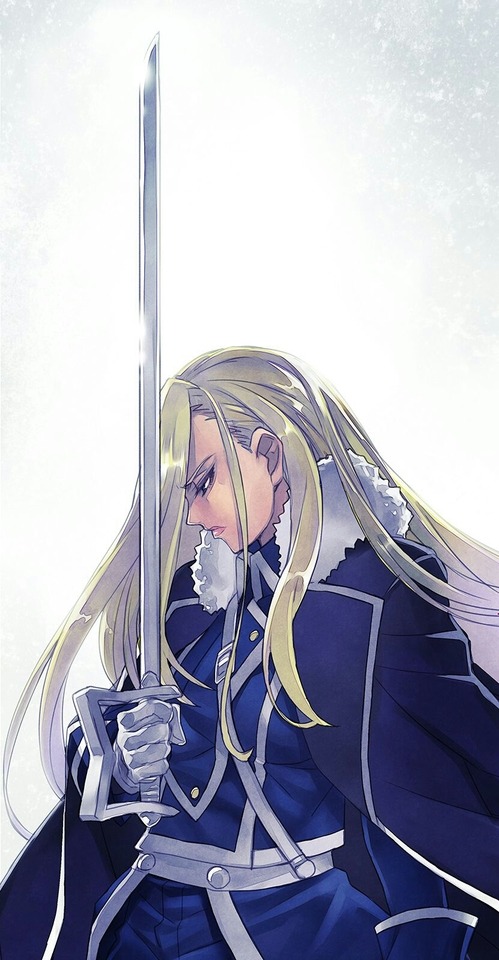
Olivier Mira Armstrong (オリヴィエ・ミラ・アームストロング, Orivie Mira Āmusutorongu), also known as Major General Armstrong is the primary heir to the illustrious Armstrong family, the commanding officer charged with the protection of Amestris' northern border at Fort Briggs and the older sister of Alex Louis Armstrong. Olivier is a severe woman who has a fearsome and commanding presence where she is harsh with her subordinates and peers and coldly merciless to her enemies, the deceptively beautiful woman's schadenfreude has earned her the nickname "Ice Queen" among the Briggs soldiers. Sharp-tongued and highly combative, Olivier is no stranger to furious chastisements and bursts of fiery violence, especially toward those who fail to live up to her high standards and staunch adherence to the "survival of the fittest" philosophy.
Top 9: Mikasa Ackerman (Attack On Titan)
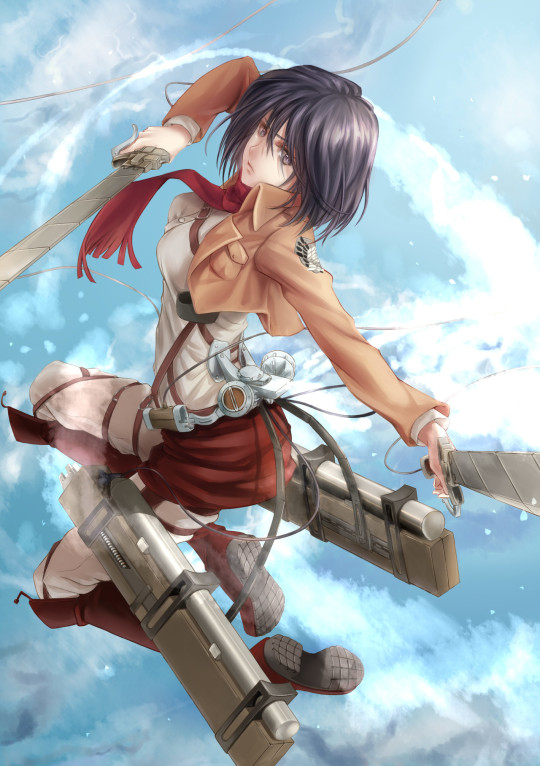
Mikasa Ackerman (ミカサ・アッカーマン Mikasa Akkāman) is the adoptive sister of Eren Yeager and one of the two deuteragonists of the series, along with Armin Arlert.
After her biological parents were murdered by human traffickers, Mikasa was rescued by Eren Yeager and lived with him and his parents, Grisha and Carla, before the fall of Wall Maria. Though she desires only to live a peaceful life, Mikasa entered into the military—where she is considered the best soldier among the 104th Training Corps. She later enlists in the Survey Corps to follow and protect Eren, becoming one of its greatest assets. She is currently serving as an officer (上官 Jōkan) in the Corps. Mikasa cares deeply for her friends and caretakers, seeing them as the last remnants of a family she cannot afford to lose. Mikasa also appears to have a soft spot for children, and she has a strong sense of right and wrong, doing everything she can to make her most impulsive friends to follow what she thinks is the right track. Despite that, she knows well that she cannot always sway them in decisions and makes it a point to follow them whenever they go, just so that she can be around to help out when trouble arises.
Top 8: Kamina (Gurren Lagann)
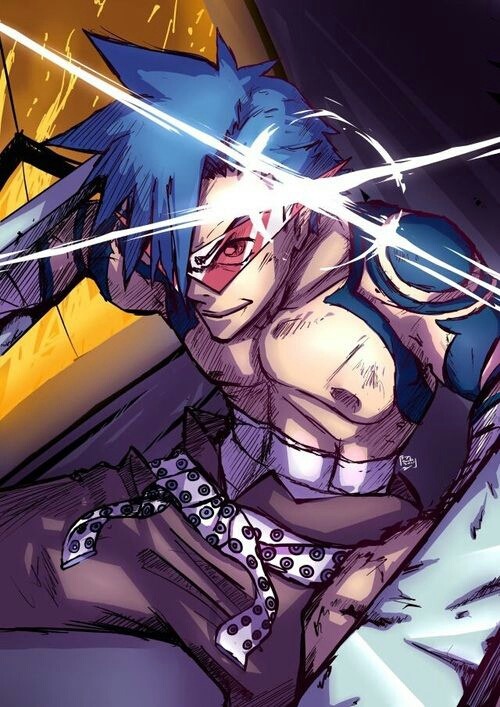
Kamina (カミナ, Kamina) was a young man from Jeeha Village, the founder and first leader of Team Gurren and deuteragonist of the first arc of Tengen Toppa Gurren Lagann. At first glance, Kamina is boisterous, hotheaded and arrogant. He demands recognition and seems hungry for greatness, illustrated in his tendency to call himself "the Mighty Kamina" and his signature catchphrase, "Just who the Hell do you think I am?!" He is an undeterred idealist, often to the point of ignorance; Yoko has described him as "a man of unlimited stupidity." Kamina is also very perverted, declaring that the urge to stare at beautiful women is the definition of a man.
However, Kamina is also extremely determined and never lets anything keep him down for long. Even discovering that his father was dead only made him solemn for a night or two (visibly at least). He is also devoted to defending and supporting his friends and loved ones, fighting with all his strength to protect them. In turn, he is very charismatic in the heat of battle, able to inspire even the timid Simon to accomplish great feats and almost single-handedly set the foundations for Team Dai-Gurren.
Despite his often brazen and practically insane actions, Kamina is fairly insightful, as his bombast and seemingly blind confidence usually mask his true intelligence in planning and combat. He even personally admits that his bravado and fearlessness is mostly a device he uses to hide his own worries and to support others, and that he thinks people like Simon are the real heroes.
Top 7: Sebas Tian (Overlord)
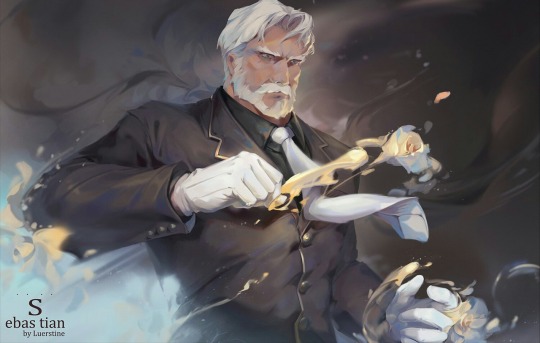
Sebas Tian (セバス・チャン), alas "The Iron Butler", is the head butler of the Great Tomb of Nazarick with several manservants and other butlers under his command. He was created by Touch Me. He is also the leader of the Pleiades Six Stars.
Although he is not one of the Floor Guardians, his power closely rivals theirs. In a way, he is independent of their chain of command. He originally served as Nazarick's last line of defense alongside the Pleiades on the 9th Floor, to give time for the guild, Ainz Ooal Gown, to prepare for their final stand in the Throne Room. Like his creator, Touch Me, Sebas Tian has a great deal of personal justice. Unlike many other denizens in Nazarick, he does not completely despise humans or see them as inferior creatures. Instead, he believes that some humans are good people and it is the duty of the strong to protect the weak. However, humans with an ugly nature disgust him and he will not hesitate to kill anyone who dares to oppose Nazarick. Sebas has a stoic nature, but also tends to question his own actions whether it was right or wrong of him to do them contrary to his master's order. Not sure why he does it, Sebas does believe that Touch Me's will is what encouragingly motivates him to act the way he does and that it conflicts with the will of his current master.
Top 6: Brago (Gash Bell)

Brago (ブラゴ, Burago), alongside his partner and bookkeeper Sherry Belmont, are considered the rivals of the main characters Zatch Bell and Kiyo Takamine, even though the teams fought a relatively small amount of times. Since their first appearance, they were one of the most powerful teams in the series, and have been seen burning more spellbooks than any other one. Brago is very quiet and is rarely seen socializing with other mamodos, he is often described as being "strong and cool". He is often seen crossing his arms or sticking them in his pockets. Not much is revealed about his life or personality, other than he resents weakness and especially requiring a human's help to win the demon kingship. However, despite often complaining that Sherry is too weak to help him, he thanks her for all that she has done for him in the final battle. He is extremely strong, often defeating other mamodo teams without even requiring the use of spells; because of his strength, which was gained from undergoing special elite training, many mamodo have come to fear him as one of the strongest. Brago's specialty is Gravity Magic.
Top 5: Guts (Berserk)
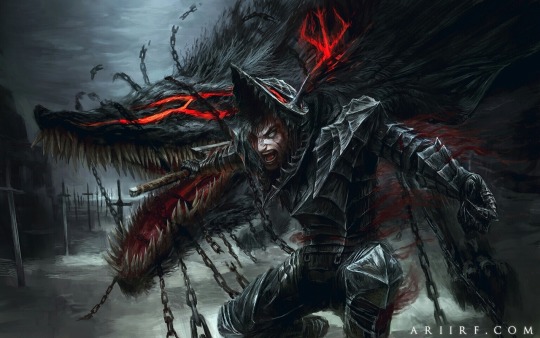
Guts (ガッツ Gattsu) , renowned as the "Black Swordsman", is a former mercenary and branded wanderer who travels the world in a constant internal struggle between pursuing his own ends and protecting those dear to him.
At one time driven solely by his will to survive, Guts finds purpose in life upon joining the Band of the Falcon, greatly helping in the faction's storied successes during the Hundred-Year War as captain of the band's raiders. He eventually becomes dissatisfied with clinging on to Griffith's dream, and departs from the band in pursuit of his own. Following the horrors of the Eclipse prompted by Griffith, Guts embarks on a two-year war against the God Hand and apostles, becoming increasingly embittered on his one-track quest for retribution. He in time realizes protecting his regressed lover is more important to him, as well as something he cannot do alone, and thus seemingly abandons his quest for revenge while fostering camaraderie with his new companions. Known for his air of austerity, Guts is a gruff, cynical man holding an overall bleak outlook on life. This is a consequence of enduring waves of suffering and numerous betrayals since his youth, with nearly all highlights of his life having, in time, become lows. In spite of his guarded, brooding exterior, he shows a more easygoing, compassionate side around the people he trusts, appearing markedly less unsociable and distant, though still retaining his dry candidness. Even as his inner darkness festers deep within him and its temptation becomes increasingly harder to resist, he retains his empathy and compassion, refusing to completely discard his humanity.
Top 4: Akemi Homura (Puella Magi Madoka Magica)
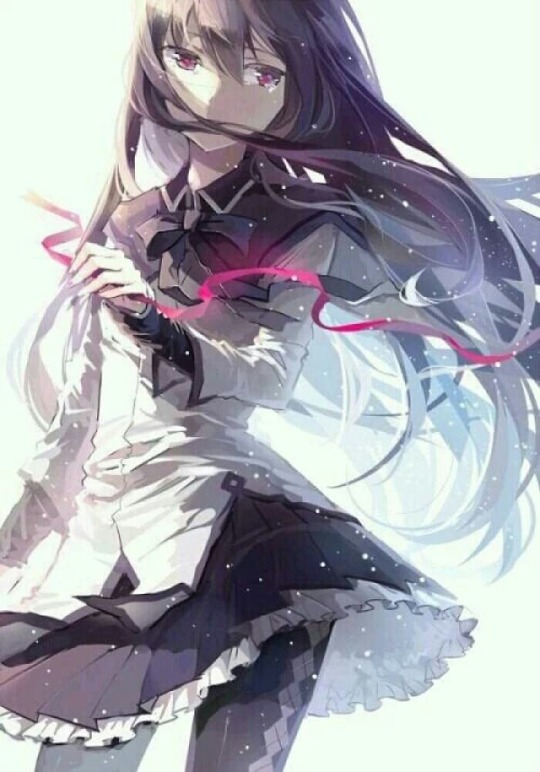
Homura Akemi (暁美 ほむら Akemi Homura) is one of the main characters in the Puella Magi Madoka Magica series. Ever since her arrival at Mitakihara Middle School, Homura is immediately depicted as being very intelligent, athletic, distant, and cold. It is revealed in episode four that she is only like this because she has seen so much suffering during her tenure as a magical girl. Because of this, she does not want Madoka Kaname to become a magical girl and tries to do anything in order to stop her from making a wish with Kyubey, going as far as to attempt to injure and even kill the cat-like creature. Despite her cold attitude towards others, she still very much cares for Madoka, as it is her sole objective to protect her due to the countless amount of blood, sweat, and tears she has shed over her jumps in time. Despite being regarded as emotionless by Sayaka Miki, Homura is far from it. Although she does not easily show signs of remorse, sadness, or pity, it is only because she had grown used to the suffering around her, and must put up a strong front to continue fighting for her goal. Homura herself has stated that she always feels badly with each life she's unable to save or alter, but nevertheless, it does not slow her down from staying true to her main objective in saving Madoka Kaname.
Top 3: Grimmjow Jaegerjaquez (Bleach)
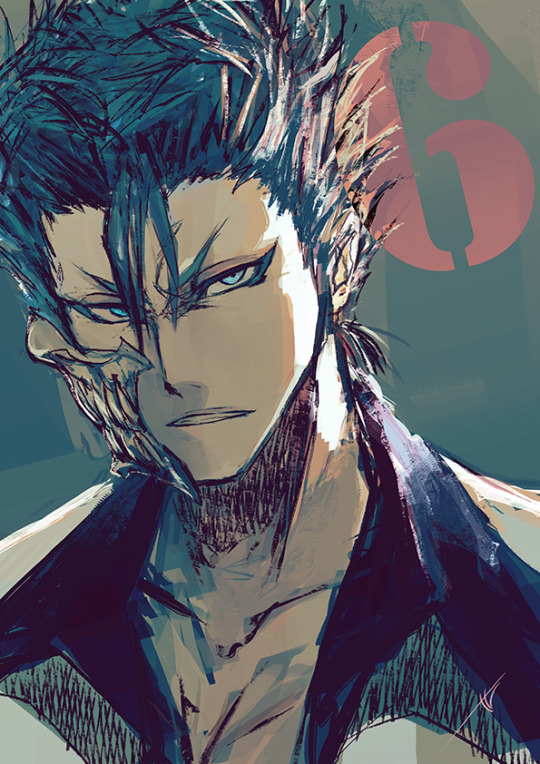
Grimmjow Jaegerjaquez (グリムジョー・ジャガージャック, Gurimujō Jagājakku) is an Arrancar and was the Sexta (6th) Espada in Sōsuke Aizen's affiliated army. While appearing to be a laid-back individual, Grimmjow possesses a brutal, impulsive, and excessively violent personality alongside a lethally short temper. However, despite his aggression and obvious blood lust in battle, Grimmjow possesses a feral cunning and has a knack for quickly exploiting any opening his opponent reveals. In addition, he is blunt, sarcastic and quite sadistic, revealing a psychotic grin or laughing maniacally whenever he becomes excited. He is also very rude and quite disrespectful. Grimmjow uses none of the honorifics in the Japanese language, except when addressing Aizen (though he is quick to discard the formality when Aizen is not around), and refers to Orihime Inoue as woman in conversation. Grimmjow displays little respect for authority and says whatever is on his mind, regardless of whether or not it is appropriate. However, he does have some form of a code of honor, as he is unwilling to fight an injured Ichigo, bringing Orihime to heal him beforehand so that their battle will be a fair one, though he also wants to defeat Ichigo when he is at full strength.He also saves Orihime from Loly Aivirrne and Menoly Mallia, who were beating her up, to repay the debt of restoring his arm, though he immediately demands another favor afterwards.
Top 2: Kujo Jotaro (JoJo's Bizarre Adventure)
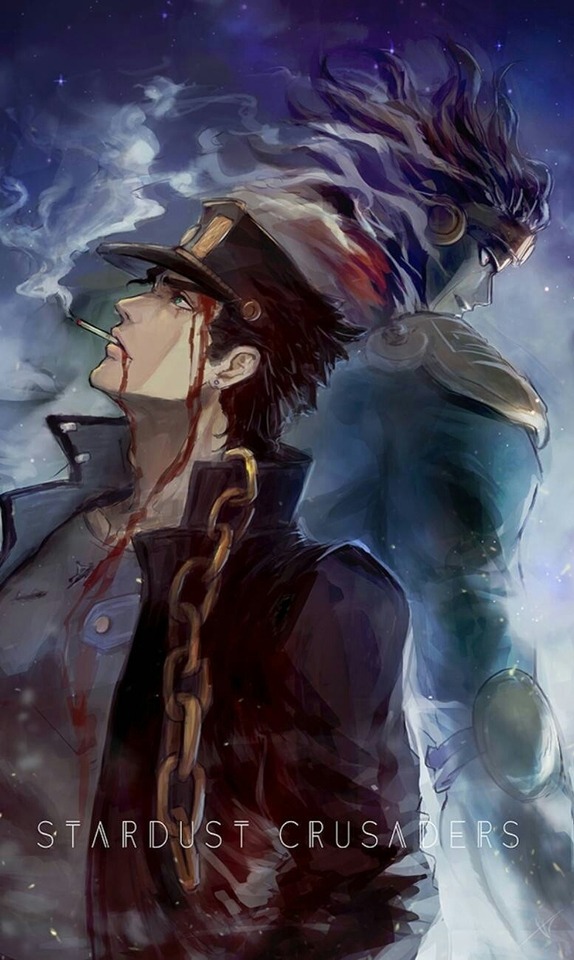
Jotaro Kujo (空条 承太郎 , Kūjō Jōtarō) is the protagonist of Part 3 and also appears in Parts 4-6. Jotaro is the third and most recurring JoJo of the JoJo's Bizarre Adventure series.
Jotaro is a delinquent who lives an ordinary life until the Joestar Family's old enemy, DIO, returns. Jotaro travels to Egypt in order to save his mother and stop the Vampire once and for all.
Wielding the incredibly powerful Star Platinum, Jotaro is the first JoJo introduced with a Stand, and is among the most well-known characters of the series. Jotaro is introduced as a rough delinquent, but he has a gentle heart, and is loyal to those he likes. He is highly perceptive, intelligent and quick-witted while keeping a perpetually cool, slightly neutral or disinterested attitude. Jotaro's most noticeable trait is his seemingly aloof nature. He is a quiet individual, often satisfied with expressing himself in short phrases. While he was shown to be mildly anxious when something unanticipated happens, Jotaro almost never goes as far as to lose his cool.
Top 1: Charlotte Katakuri (One Piece)
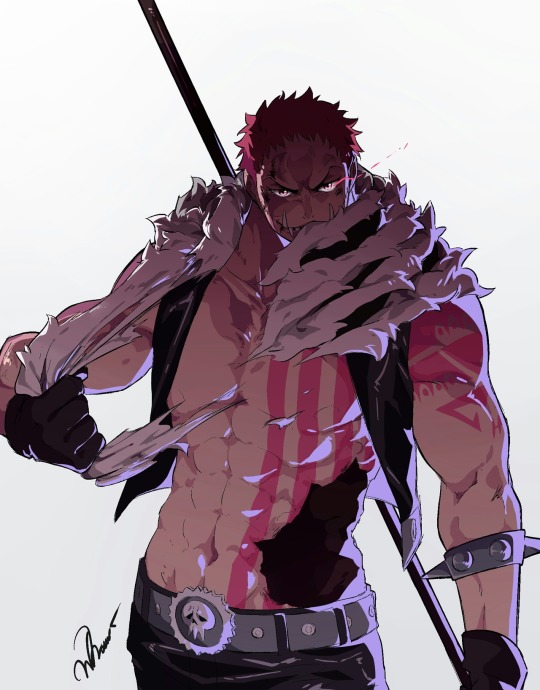
Charlotte Katakuri ( シャーロット・カタクリ , Shārotto Katakuri) is the second son and third child of the Charlotte Family and the elder triplet brother of Daifuku and Oven. He is also one of the Three Sweet Commanders of the Big Mom Pirates and serves as Totto Land's Minister of Flour (粉大臣, Kona Daijin), governing over Komugi Island.
Due to his actions and role, he is the secondary antagonist in the second half of the Whole Cake Island Arc. Katakuri has a very serious, no-nonsense demeanor, caring greatly about his crew and family's objectives. With his heightened Kenbunshoku Haki allowing him to see a little bit into the future and make smart judgement calls, he is dedicated to efficiently dealing with all possible threats within his vicinity, and is thus among the few Charlotte children that can be seen taking action without instructions from Big Mom herself. Katakuri is a pragmatic individual who puts efficiency above almost everything else, to the point of being considered a perfectionist. He rarely brags about his abilities, instead being rather focused on accomplishing his goals as fast as possible, intercepting and defeating his enemies in a quick, effective manner while prioritizing the elimination of threats he perceives as potentially serious, going as far as taking extra steps to ensure they are stopped in case his mother and siblings fail to do so. He is also capable of extreme brutality as shown when he pondered on how he should maim Luffy with his trident. Though ruthless to opponents, he is extremely caring towards his family and subordinates. Katakuri is also a honorable man who dislikes other people interfering with his fights. Though he considers Luffy his enemy and desires to eliminate him personally before he can become a threat, he wishes to defeat him fairly. After discovering that Flampe was the one attacking Luffy and lowering his performance in the fight, Katakuri injured himself in the same spot he injured Luffy to compensate and angrily shouted at Flampe for interfering in his fight.
#anime#fanart#Charlotte Katakuri#Grimmjow Jaegarjaquez#Kujo Jotaro#Akemi Homura#Guts Berserk#Brago#Sebas Tian#Kamina#Mikasa Ackerman#Olivier Mira Armstrong#One Piece#Bleach#Jojo's Bizarre Adventure#Puella Magi Madoka Magica#Berserk#Berserk Manga#Zatch Bell#Gash Bell#Konjiki No Gash Bell#Overlord#Tengen Toppa Gurren Lagann#Gurren Lagann#Attack On Titan#Shingeki No Kyojin#Fullmetal Alchemist#Fullmetal Alchemist Brotherhood
69 notes
·
View notes
Text
some thoughts on widojest, vaxleth, and biphobia in fandom culture
i avoided getting into critical role for a very long time cuz ppl always said that it was homophobic because of the semi-relationship between vax/gilmore. but let me just say that calling that situation homophobic is biphobic. as a bisexual person, seeing a character that is openly bisexual express interest in men, women, and all those in between, is INCREDIBLY important. it normalizes bisexuality because the amount of times i see non-bisexual ppl in the LGBT+ community claim that we’re “not gay enough” is ridiculous. vax is definitely good bi rep.
i hate that i avoided critical role for so long because of that lie saying it’s homophobic. it is a beautiful show filled with wonderful representation. are we going to forget about tary? vex? beau? yasha? molly? sure, the representation isn’t perfect, but at least they’re trying and improving! that’s more than we can say for a lot of media, and we shouldn’t disregard the representation because it isn’t squeaky clean.
and now this whole thing/fan reaction with widojest? i’ll be the first to say that i’m not the biggest fan of the ship, but it’s also not my choice. it’s liam’s choice because caleb is his character. also, as someone that plays d&d, i can tell you that characters take on minds of their own. conscious choices can’t always be made regarding a character’s emotions or feelings. as much as it seems like liam made the decision for caleb to be in love with jester, as someone that plays d&d, i am quite certain caleb made that choice himself. in my experience playing characters, they take on minds of their own, and they just happen to take residence in the player’s mind. even if this weren’t the case though, liam still knows caleb the most.
even though i’m not in love with this ship, i’m happy for the people that like it because it’s not us against them. we all love the same show, so why are we fighting over this? we love it. we should be happy for each other but sad for ourselves.
i interpret caleb as bisexual, and i interpret his interactions with essek to be flirtatious, such as many other queer fans do. HOWEVER, this is not the same situation as vax/gilmore, who went on at least one (if not more, i haven’t watched c1 all the way through) on-screen dates. shadowgast, as much as i love the ship, has little-to-no canon confirmation outside of off-handed hints and comments in the game and on talks. also, vax ending up with keyleth was still totally valid because HEY GUESS WHAT HE’S BI. not to start discourse or anything but to say that this is bad representation is super toxic to bi ppl because telling us we can’t be bi if we’re in a m/f relationship is just wrong.
but anyway, everyone comparing the widojest situation to vaxleth is getting on my nerves because:
vaxleth was not homophobic
widojest is not the same situation as vaxleth
it isn’t homophobic either
saying that both are homophobic because you don’t want to see a m/f ship hurts bi fans
if you want to disagree with me, that’s fine. however, i think there’s something rly important that i need to say in regard to what i’m witnessing in this fandom.
you don’t have to like a ship. that is okay. you don’t need to make it “problematic” in order to dislike it. in the end, expressing your dislike of vaxleth and widojest because you believe them to be “lesbophobic” (because it interferes with beaujester) or “homophobic” comes off as, frankly... biphobic. while trying to come off as woke, it just comes off as regressive and hurtful.
some may argue that it’s not progressive for a bi person to be in an m/f relationship, but i completely disagree. part of being bisexual is the attraction to all genders, and not portraying so is honestly a disservice to the sexuality. also, as i mentioned earlier, there is a huge trend is saying that bi ppl in m/f relationships are actually in “straight” relationships and that it’s not “gay enough.” projecting these feelings onto media and saying this to bi fans deeply hurts them. there are already enough bi ppl out there, including myself, that feel insecure in queer spaces regarding their attraction to the opposite gender, because they’re afraid of receiving comments such as ones like those.
but anyway shipping should not be this big of a discourse, and frankly, it shouldn’t be this deep. it’s okay to dislike a ship without making it problematic, especially if making it “problematic” is hurting bi fans, like myself, in the process.
widojest stans, i’m happy for you. i hope that you’re able to enjoy this confirmation despite some of the negativity i’ve seen. don’t forget to love each other ❤️
#if you need to talk about this#or have any reservations about this post#feel free to message me#or send me an ask#i'm open to conversation#cr discourse#vaxleth#widojest#caleb widogast#liam o'brien#critical role#critical discourse
201 notes
·
View notes
Text
The Perfect Ending for Dean and Sam? - Supernatural 15x20
As I read reviews about the Supernatural series, nothing disturbs me more than reading things like the title of this essay, “This was the Perfect Ending for Sam and Dean.” It’s disturbing because as fans of this 15-year show, we are accepting mediocrity. Far from being a perfect ending, this was one of the worst television show endings that I have ever seen because the characters weren’t allowed to change and grow.
When I watched the Supernatural series finale, I was struck by the realization that this could have easily been the finale of season 1. In season 1, we were dealing with Dean’s feelings of being second best, Sam wanting a “normal” life, Dean choosing the dangerous world of hunting, and the value of saving the innocent despite the dangers. In episode 15x20, the episode implies that we are still dealing with the same themes from episode 1, even though SO many events have passed, and Sam and Dean dealt with their own issues in varying ways. Dean’s death during a mundane hunt harks back to season 1’s warnings and omens about the dangerous life of a hunter. Meanwhile in season 15, the Winchesters are fighting God and survived that battle. Sam’s “happy” ending harks back to his desire to be with Jessica and find a happy, “apple pie” (normal) life. Meanwhile in season 15, Sam has lost everything… again. He lost his adopted son, his good friend, his mother for the second time, his surrogate father, his girlfriend (what happened to Eileen?), and his brother. Also, let’s not forget that Adam died and was a Winchester. Season 15 does not agree with, and contradicts, its final episode.
Everything that has happened after season 1 and right before the series finale doesn’t matter. That is the message the series finale communicated with fans. Some fans might be alright with this message because it’s such a long series, too much has happened, but there are many fans who have avidly watched these characters grow and change. They themselves have grown and changed with these characters! Watching the finale felt like a slap in the face, a surreal dream, because the writers and the show-runner shut the door on any type of meaningful change that has occurred throughout the series. Throughout the years, Sam and Dean were able to create meaningful connections outside of their partnership, noticeably with Jack and Cas. Both were only mentioned. That merits repeating again. Castiel, who had become a fan favorite in the series, only gets a few mentions. Dean, the one with whom he shares a profound bond, shrugs off his death and continues enjoying his pie. Like the last 12 years of developing that friendship, emphasizing their bond, and teasing fans with their deep connection meant nothing. Because ultimately, the show sent a clear message to its viewers: it doesn’t matter what these characters have gone through, it doesn’t matter the people who have come and enriched their lives, but what matters is where they started. The journey, and the accompanying life experiences, don’t matter.
I read a really hurtful review about the series finale that implied that Sam could only be happy on Earth because his brother had died. He was no longer his brother’s keeper, so now he could have everything he wanted- a family and normalcy. That was the Sam of season 1 - before his brother died for him, before he died for his brother, before his demon blood addiction, before he saved the world numerous times, before he adopted a half angel kid into his family, before meeting his Mom again. All of those experiences profoundly change a person. His idea of normal and happiness changed, became vastly different. The show hinted at this when we saw the names carved on the table in episode 15x19. Sam stopped running away from hunting, his duties, struggled with his destiny, and fought for his freedom and seemed content with what he had. The show even implied a budding romance with a fellow hunter, Eileen. Sam from season 1 would have turned away from all this because it interfered with his desire to be normal. However, this was shoved at Sam in the most confusing, contrived, and sickening manner. After Dean dies during the series finale, Sam mopes for a bit, then he goes on a hunt, and reverts back to Sam of season 1 with ease. He gets everything he’d wanted- an unnamed, unseen wife and a child who he names Dean. If Sam from episode 15x19, 15x18, from any episode after season 1, saw this ending for himself, he would have run away screaming. He wouldn’t be able to accept it. Why? Because that’s not what he wanted for himself anymore. He wanted to be with his loved ones, which included Dean plus his extended family.
If Sam’s ending was problematic, Dean’s is inconceivable. This is a character who has struggled with so many issues and low self-esteem and has gone through so many ups and downs that to see him die, impaled on a nail by clowns, devastated and confused many fans. I actually laughed out loud when he died because it was so ridiculous. It hurt to see a beloved character treated like trash, then proceed to accept his death with arms wide open. Where was Dean’s desire to live? This is the man who survived hell, saved the world several times, sacrificed himself for Sam, and had to fight daily to survive. And I don’t mean in a I’m-a-hunter-and-life-is-dangerous way, but in a real, this-world-is-fucked-up-and-I-can’t-do-it anymore way.
That was what always attracted me to Dean. His fight to survive in a world that didn’t make sense to him, and his ability to cling to life despite feeling too broken and inadequate. For many of the fans, they resonated with that and admired him for his grit and his humanity. In the series finale, Dean gives up. He accepts death, accepts this strange looking heaven, even though he was weirded out by heaven when he first encountered it. He rides around in his car- alone and waiting for Sam. That’s what Dean boils down to- alone and living for Sam. The show sends a message that Dean doesn’t deserve anything else. Despite everything he’s done throughout the 15 years of this series, Dean can’t escape his destiny to die on a mundane hunt. The same death that had been foreshadowed in season 1. With only his brother with him to see him go. Dean fought so hard to be free from Chuck’s stories and from his own demons that to see him reduced to drinking beer and riding around in the Impala felt like he’s regressed 15 years. And some fans think he deserved this? What has Dean done to you?
Dean had potential to show growth and to show true change and progress through a possible relationship with Castiel, but the show metaphorically gave its queer fans, their allies, and narrowed minded viewers a big middle finger. Yes, even people who hated the idea of Destiel, you should be angry. Instead of the show stretching your thinking and challenging you to accept something different and progressive, the show decided to pat you on the head and feed you some metaphorical shit. Please don’t eat it. Throughout the show, there had been signs that Dean and Castiel shared a profound bond that extended into a romantic subtext. It started with the angel’s entrance and charisma, and Dean’s acceptance of him into his life (very rare for Dean to form lasting relationships), and it ended with a confirmed love confession. Now, imagine that you’ve been hoping for years that all these hints, looks, and jokes would go somewhere. That maybe someone will validate your views and make you feel like you’ve brought progressive change to television. Well, that’s what it felt like to be a Destiel fan after episode 15x18. Destiel became half canon! Castiel declared his romantic feelings to Dean, which Misha Collins confirmed to be of a homosexual nature, but he knew that he couldn’t have what he wanted. He died to save a shell-shocked Dean Winchester. Not only did the show kill Castiel, but they sent him to hell (granted, he didn’t stay long), and they sent Dean Winchester, the man who stayed “straight,” to heaven.
This was problematic in many ways. One, the message is homophobic, heinous, but subtle. If you’re gay or queer, you are thrown away, never to be seen again because your feelings will upset the masses. It’s what happened to Castiel, a confirmed queer character. When episode 15x20 finished and Dean hadn’t even mentioned Castiel out of his own freewill, I was upset. Here comes the second problem. This show had used queer-baiting for the past 12 years or so to keep its numbers up and to keep itself on the air. It used queer-baiting to a most hurtful and insidious way to attract viewers to the series finale. Then, they shut it down after teasing something that several, enthusiastic fans had wanted for years. Why open this pandora box if you aren’t going to do anything with it? What is the point? Leading people to create false assumptions, playing with people’s emotions in a negative way, reinforcing negative heteronomative stereotypes- this is what the show has accomplished. This is its legacy.
I wrote this essay to free myself from this show. After this, I am not a Supernatural fan anymore. This show has left a bad taste in my mouth, and I want nothing to do with it or anyone associated with it. I urge you to free yourselves as well and also to not accept this mediocrity that Supernatural gave us. Stop other shows and networks from manipulating and leading on its fans. Stop them from ignoring years of growth in order to feed you the same story and keep you mediocre and small. I know the pandemic of 2020 made things difficult, but that’s no excuse to create the subpar work the Supernatural writers/show-runner/staff did. With just a little bit of creativity and intelligence, they could have produced something great, no matter the obstacles. I used to believe in that.
Supernatural, thank you for the years of enjoyment, but I never want to see you again.
#supernatural#supernatural series finale#supernatural series#dean winchester#sam winchester#cw spn#carry on#supernatural 15x20#15x20 carry on#essay
8 notes
·
View notes
Text
Flash Review: What’s Wrong With Secretary Kim?

Park Seo-Joon as Lee Young-Joon, and Park Min-Young as Kim Mi-So.
Release date: June 6 - July 26, 2018
Episodes: 16
Available on: Viki
Summary: Lee Young-Joon is the Vice Chairman of the YumYung Group, a large corporation and the family business. He’s smart, successful, and supremely confident to the point of narcissism. Kim Mi-So has been his secretary for the past nine years, proving herself to be extremely efficient in the execution of her duties and the only person who can keep up with his ego and intellect, anticipating her boss’ will and seeing it carried out. One day, out of the blue, Kim Mi-So announces she has decided to quit her job and start a new chapter in her life, what takes Young-Joon entirely by surprise. This event forces the two to review their relationship, as Young-Joon realises he doesn’t want to let her go, and Mi-So starts seeing other sides of her boss’ personality as she realises he might have feelings for her. As this is a kdrama, the return of Young-Joon’s hated older brother, Lee Seong-Yeon, complicates matters when he suddenly enters Mi-So’s life, turning himself into a rival romantic interest. Meanwhile, Mi-So starts looking into an old kidnapping case connected to the two brothers.
What I liked:

The pacing and execution of the romantic relationship. One of my main complaints when I reviewed The Secret Life of my Secretary (TSLS for short) was that I felt that show took too long to develop the relationship between the boss and his secretary, dragging the deception more than it should have, and even when the leads eventually admit they have feelings for each other, 24 episodes in, it didn’t quite feel believable and the wrap up felt a bit rushed. The Vice Chairman and Secretary Kim manage to get there by Episode 8, selling it every step of the way, giving us another eight episodes to see how their relationship progresses and concludes. Romantic misunderstandings, that staple of most romcoms, are thankfully kept to a minimum, something I was extremely grateful for. For instance, when the beginning of one such misunderstanding rears its ugly head at the end of Episode 8, Secretary Kim doesn’t waste a second to clear the air with the Vice Chairman and declare her feelings for him, marking the beginning of their romantic relationship. They still have their disagreements (Secretary Kim is definitely not a pushover) and face their share of obstacles and objections to their relationship; we see how their relationship plays out in the workplace, sometimes with hilarious results (Mi-So can be very protective of her boyfriend!); we’re treated to the expected bouts of jealousy from the two leads, the apparently required drunk scenes, etc. In short, it’s what you’d expect from a good Hollywood romcom but longer.
The absence of the “family member X trying to usurp power from the lead brother” trope. So refreshing to do away with this trope every once in a while. You will find no evil conspiracy here directed at any of the leads, a staple of kdramas where a chaebol’s involved, giving us more time to explore the relationship between the Vice Chairman and Secretary Kim, which is frankly what this show is all about. We still have that jerk relative that shows up to cause trouble, but he’s mostly harmless. I will address this plot in the next section.
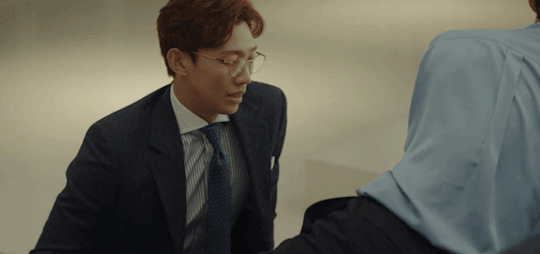
The humor. The humor in this show is comprised of four elements, which I’ll proceed to highlight in bold. If you’ve watched the show, perhaps the first thing that comes to mind is Kang Ki-Young, who plays Young-Joon’s best friend, councilor, and president of the Yumyung Group, Park Yoo-Sik, as he does a fantastic job providing comic relief, taking advantage of the fact that he’s the only person who can make fun of Young-Joon and get away with it. I particularly liked his interactions with his clumsy and forgetful secretary, a pairing many viewers shipped. While I was taken aback by how much I liked him in Bring it on, Ghost, I was definitely less surprised to see what a great job he did here. Easily the best supporting character in the show. However, I feel Park Min-Young’s Kim Mi-So gives him a run for his money, not for being a prankster but because of how she reacts in any number of situations (as does Yoo-Sik), from trying to hide her boyfriend from her sisters, through punching a stuffed cow to make room for her virtual boyfriend, to trying to suppress her feelings of jealousy when faced with the prospect of having a rival for Young-Joon’s affection. You could call it situational humor perhaps, but seeing Mi-So’s facial expressions and her demeanor in these situations is priceless. These two are not the only actors/characters who partake in the show’s humor, but I believe they’re the standouts. Next on the list are the show’s well-placed sound effects, from weather effects to animal sounds, which really bring out the humor in certain situations. The sound effects in this show are 100% on point. Last but not least is the inclusion of a certain animated devil who pops up from time to time when Young-Joon or Mi-So are having lewd thoughts. As Young-Joon says at one point, “Fighting!”
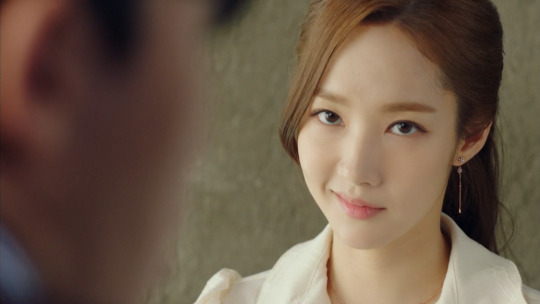
Secretary Kim’s many facial expressions. Pity the sound effect wasn’t timed right in this scene.
What I didn’t like:
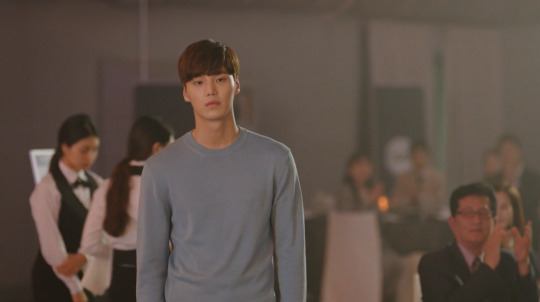
The older brother and the execution of his storyline. Perhaps I am less inclined to like his character because I initially watched the episodes out of order. During the first few episodes, Young-Joon’s brother, Seong-Yeon, clearly appears as the more likable of the two, returning home after years abroad, ready to make amends, only to find a brother who has nothing but contempt for him and a family who still favours Young-Joon. One should sympathize with him under the circumstances. However, for my part, Seong-Yeon showed his true colors even before he regained his memories. As I mentioned earlier, his return also results in the two brothers holding an undeclared contest for Mi-So’s affections, with Seong-Yeon believing he has the upper hand because of a past connection with her. When Seong-Yeon boasts how he’s going to exploit this connection to get her that was the moment I went, “This dude’s an asshole. He’s really going to exploit a painful memory simply to one up his brother.” Young-Joon, on the other hand, was actually doing his best to protect Mi-So from it, even at the risk of losing her. However, beyond Seong-Yeon’s likeability as a character, from a narrative standpoint, I just can’t believe the two brothers haven’t settled their score after two decades. Further, his transformation from jerk to good brother after he regains his memories seemed a little rushed, a little forced, with some scenes seemingly set up to cast him in a more favourable light. I have my strong doubts that someone who’s experienced that kind of mental trauma would make such a recovery in such a short amount of time (days? weeks?). Ultimately, he came across more as a plot device than a character.
How the parents handled the kidnapping. Letting your kids believe a lie for decades is not the way you handle a traumatic experience! It strikes me as unbelievable, irresponsible, and utterly reproachable, that the parents would rather scar their children for life than send them to therapy, especially when time proved that the lie had not improved the brothers’ relationship and possibly made it worse. There’s also some inconsistency with the character of the mother, who at one point looks to Mi-So to take care of Young-Joon, hinting she knows of their relationship, only for her to later ask Young-Joon not to date Mi-So because that would make Seong-Yeon unhappy. The gall of this woman. Fortunately, Seong-Yeon intervenes (this is the favourable light scene I mentioned earlier), as the mother was about to make yet another parenting mistake. I’m also slightly skeptical she didn’t figure out the truth behind the kidnapping earlier, specifically, the moment Mi-So’s involvement is revealed, a secretary Young-Joon personally selected over more qualified candidates. It’s a relatively minor detail though.
OTP: Damn, these two can kiss! If that’s not chemistry, I don’t know what is. Every moment these two are together is just perfect. I’ll admit I disliked Young-Joon’s unhealthy possessiveness, but I understand this was a conscious choice to show how much his character changes as a result of his love for Mi-So, eventually willing to let her go and choose a new path. I know some people disapproved of Mi-So’s decision to stay as Young-Joon’s secretary, seeing it as a regression and arguing she should try something new, but I disagree. At the end of the day, what’s important is that Mi-So is no longer pressured by circumstance to follow a path but is now finally able to decide for herself knowing she has someone in her life who will support her regardless. I’d question the timing of her decision but not the decision itself. She can always quit later. I also appreciated this show wasn’t afraid of showing the two characters actually tie the knot. Makes for a good change of pace.
youtube
Verdict: Initially, I dropped this show like a bomb in the middle of the first episode, as the thought of having a hardcore narcissistic boss as one of the leads did not appeal to me one bit, and having just finished watching the disappointing The Secret Life of my Secretary I really didn’t want to waste much more of my time on a show that promised to be similar. I was utterly wrong, as it turned out. What’s Wrong With Secretary Kim? is a great office romcom, with Park Seo-Joon and Park Min-Young easily delivering on the romance and the comedy, aided by Kang Ki-Young and a solid supporting cast. This is an easy recommendation and definitely worth watching multiple times.
Rewatch meter: High
24 notes
·
View notes
Text
The 100 (re-)rewatch: 4x13 Praimfaya
What do I say about this episode that hasn’t been said already? It is for The 100 what Through the Looking Glass was for Lost: a game changer, arguably marking the end of the first half of the show (though 4x05 was technically the 50th episode) and re-defining it.
This time, instead of making notes about the timeline at the end, I need to start with it: The largest chunk of the episode takes place over less than 3 hours, and is a race against time and against the upcoming death wave – just 90 minutes to make the pod intended for two people functional for 8 people and get the air recycler from the lighthouse bunker, then an hour to get to the Ring and for Raven to open the hangar door manually so they could enter before their air goes out… And then there’s time jump of 6 years and one week, or 2199 days. If feels insane, but this period was 11 times longer everything that happened in seasons 1-4 from the Pilot to Praimfaya (around 6.5 months, or 200 days).
To be fair, the season 5 finale was another game changer, and the only episode that may have had a timeline even weirder than this one – but the second time-jump, even though it lasted 125 years, did not have any of the same weight and meaning for anyone other than Monty, Harper and Jordan, since everyone else was cryo-frozen and practically continued their lives as if they had just gone to sleep a few hours before. But the time jump revealed in those last few minutes of the season 4 finale affected all the characters. They all lived through these 6 years that the show skipped, and only showed in about 2-episode worth of flashbacks (or not at all, in the case of Spacekru), profoundly changing their lives, relationships and arcs.
Apart from the radio talk between Bellamy and Octavia at the start of the episode, and two short scenes in the bunker, which are there to round up their story for this season, and the short appearance of Madi in the last couple of minutes, the entire episode involves just 8 people – Clarke, Bellamy, Raven, Murphy, Emori, Monty, Harper and Echo.
Octavia was well aware that she wasn’t ready to be a leader: “All I did was win a fight”. Bellamy tries to give her some confidence, saying she also gave people hope. But his comparison to – Prometheus – wasn’t the greatest, because, as Octavia points out, Prometheus got punished by the gods by being chained to a rock while a bird plucked his entrails. Dark foreshadowing for Octavia’s future?
The radio dies, so Clarke doesn’t get the chance to say goodbye to her mother. It’s an understatement to say that this is not the last time a radio dies and Clarke isn’t able to get through to someone.

Eh, about that…
Octavia tells Bellamy “I love you, big brother”. Bellamy tells her “I love you” back, for the second time (after he’s said it for the first time, to anyone, in 4x11). They have both made the point that it takes the end of the world for them to say it. These final episodes of season 4 are the time when several of the characters are expressing their true feelings to each other. Monty said it to Harper in 4x11, but she wouldn’t say it back at first, and lied that she didn’t love him, to make him let her die. Jasper tried to make Monty say it to him before he died, but Monty said it too late. Harper admitted to Monty that she did love him, after she had decided to live. Monty said “I love you” to Harper again in 4x12 while they were in the rover. And Murphy now talks to Monty about his relationship with Emori and Monty’s relationship with Harper, telling him that he’s experienced how love changes you, and asks him if he has told Harper he loves her.
And – totally unrelated, I’m sure – Clarke and Bellamy have deep conversations about their relationship, where Clarke wants to tell him something important, because she thinks she is dying of the radiation she got in 4x12 after she took off her helmet for a while and before Monty and Harper arrived and gave her Jasper’s. A large part of why she believes that is due to Abby’s vision. But because she implies she may die (“If anything happens to me…” – “Nothing is happening to you”), he interrupts her, because he can’t stand that idea – the same way she interrupted him when he wanted to tell her something before they separated in 4x06 (“If I don’t see you again…” – “You will!”). Interesting how those two always keep having interrupted conversations where one of them seems to want to say something important. I don’t know what that could be. They end up talking about their relationship, the leadership, Head and Heart, as Clarke is praising Bellamy for his big heart (something she always found appealing in him was his ability for love and devotion – which she saw in his feelings for his sister, even early on in season 1) and advising Bellamy to use his “Head” more, to be a more rounded leader. In the context, she is not criticizing him, she is trying to tell him he would have to be the sole leader, without her, because she thinks she’s probably about to die. She won’t, but he’ll indeed find himself in a situation where leaving her behind will really be his “only choice” – at least one that makes any sense, as staying and waiting would have only killed him and the other 6 people with him, while Clarke would have still died (or lived) regardless.
But I’m sure nothing in that conversation was deeply personal or intimate…
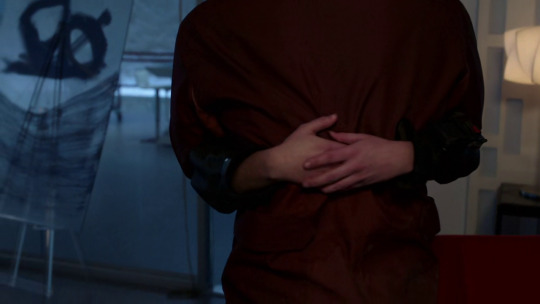

And later, when Bellamy is about to leave with Murphy to save Monty, and Clarke is about to go on her own to align the satellite dish so they could dock at the Ring – which will prove to be the last time they see each other in 6 years – Clarke stops Bellamy briefly to tell him something (even though they’re in a hurry, and Raven and Murphy are also present), and he interrupts her again, expecting another talk about leadership and using his head (he obviously didn’t realize the weight of that talk the first time), and she says she just wanted to say…”Hurry”. That doesn’t really seem like something you’d stop a person to tell them, when they’re already in a hurry. It’s almost like the episode was teasing that she had something else to tell him there. Now what could that have possibly been, hmm…
To be honest, I’m sometimes not sure how I feel about the Head and Heart phrase, because the fandom tends to take it too far and simplify both Clarke and Bellamy as characters and not really do either justice, making it seem as if Bellamy can’t or has never been calculating (like manipulating the Delinquents into taking off their wristbands, or pretending to be manic and self-harming while in a cell, in order to hurt himself enough so Abby would have a reason to come and set him free) or offered the more rational options (like not telling people that the knife Wells was killed with was Murphy’s, or not telling them immediately about Praimfaya until they have an idea what to do about it), or as if Clarke hasn’t acted purely on emotion so many times. I’ve seen people make contrived arguments why some of the things Clarke did (like desperately going into Mount Weather without any plan and doing everything to save the people she loves, or mercy killing Finn to spare him torture – after having done everything to save him, including offering her own life) were supposedly so cold and logical they would make a Vulcan proud, or people complaining why Clarke, who is “supposed to be a logical character”, did unwise things because she was emotional when, for instance, her best friend got murdered, or when her daughter seemed to be in danger. Both of them are, in fact, much more complex characters, and, as most people, many of their actions are a combination of reason and emotion. And it certainly doesn’t mean that one of them is more able to love than the other, or that the other has lost that ability after having to be a sole leader and assume both roles. The Head and Heart works better as a description of how they usually/typically approach leadership and decision-making at this point, where Bellamy can rouse the crowds with emotional speeches, give more successful pep talks to the others (although Clarke does great pep talks to Bellamy) and usually has a better feeling for the emotional state of the crowd, while Clarke is more likely to appeal to people with pragmatic arguments, try to forge alliances with outside forces, and look at the big picture. And I don’t think that makes their relationship codependent: they can both function on their own – and have – but they function much better together.
At the beginning of season 4, Raven arc seemed to be about leadership and having to make tough choices – she had a mini-arc in 4x03 where she started off telling Clarke that, while Raven was in charge of rations, choosing who lives or dies was Clarke’s specialty (!) when she told Clarke to make the list, but then went on to practically choose who lives or dies by denying medicine to Luna’s people. That did not end up having any consequences, but the rest of her arc this season was instead about her relationship with herself, her pain, confidence, her mind and will to live. This was beautifully resolved in 4x11, but in the subsequent two seasons, the show hasn’t seemed to know what to do with her. (It would be great if that arc about having to be the one to make the tough decisions and decide on life and death happened for her in season 7.) In this finale, she has another moment of self-doubt and regression, worrying that she is not smart enough without ALIE’s code in her brain. But after getting pep talks first from Clarke and then from Bellamy, telling her basically the same thing she had told herself in 4x11 through her vision of Sinclair, she finds the solution exactly by remembering what ALIE did in season 3 when she uploaded herself to the Ring. Something that was a moment of defeat for Raven against ALIE back then, now helped her find a way to save herself and others.
Murphy’s season 4 arc was mostly about him forging real friendships and being accepted into the group of people he antagonized and was exiled from season 1, showing that he changed during the time he was away from them and was not the same douchebag, now that he knew how to love another person. But out of the core group, someone he’s had the least amount of interaction with was Monty. This was their first serious interaction, and in fact, the first time they’ve even been in the same place since early season 1. That means that Murphy didn’t expect hostility from Monty because the latter wasn’t among the people he had seriously hurt (he had already been kidnapped by the Mountain Men by the time Murphy’s murder of Connor became known and by the time he murdered Myles, tried to kill Bellamy and shot Raven), but he had forgotten the fact that Monty only remembered his jerkass persona and behavior from the early days on Earth, and the way he kept wishing for wounded Jasper to die – and that Monty has not seen any of Murphy’s development. Of course he hates him, I hated Murphy in season 1, too! But this relationship gets a big leap forward when Murphy brings the machine and goes back for Monty together with Bellamy, and even gets a hug.
Monty’s line “Eight people in space, and one of them is John Murphy” has the same energy as Clarke’s “The last two people on Earth, and one of them is a child from hell” from 5x01.
Jasper is, understandably, a very sensitive topic for Monty. And Murphy’s ill-thought line about “coward’s way out” (which I don’t think was malicious, as he had just praised Jasper for being stronger than he seemed) probably upset him even more because he had had similar thoughts: a few episodes ago, he called Harper a coward for wanting to commit suicide.
As for the Grounders in Space, Emori and Echo, due to their completely different backgrounds and histories, have the opposite reactions to all the new things they are encountering: spaceship, lack of gravity, seeing Raven spacewalk… Emori is excited and takes to everything new easily. She was an outcast, she never had an opportunity to be tied to one place or belong to a group of people, and has no reason to feel nostalgia for the Earth she’s leaving; and she’s used to adventure and adjusting to new circumstances. Echo is confused, somewhat scared, and lost without the things she knows, and without her clan to be loyal to and work for. (Maybe my biggest problem with the writing for Echo is that the show insists calling her a spy, which doesn’t fit with anything we’ve seen of her job, her actions or personality. By all accounts, she was a soldier/captain of the guards/assassin for Azgeda, who prefers to use direct methods, brute force and violence, while being subtle, perceptive, keeping a low profile or adjusting herself easily to new circumstances are really not her strengths.) These last few episodes of season 4 probably contain the best characterization Echo ever got in the show, and it’s certainly Tasya Teles’ best acting, particularly during her suicide attempt.
While Emori finds in Spacekru a family she’s never had, Echo finds a new clan, new group of people and leader to give her loyalty to. You can already see the change in Emori – she’s starting to care about people other than John, when she asks to give Clarke more time before they leave her. Emori and Murphy joining forces to give Raven the necessary oxygen seems to be setting up that trio as a close friendship on the Ring.
After Bellamy has helped Echo with her helmet in a small moment in 4x12 and then talked her down from suicide in this episode, the show is really not subtle in trying to foreshadow Bellamy and Echo’s relationship with this:

(Oh look - the old “just falling on each other” trope that TV shows do when they want to foreshadow something will be a thing, without actually bothering to develop it! ..Wait a moment, Monty and Harper fall next to each other, Bellamy and Echo fall next to each other, and Murphy and Emori and... Raven fall next to each other? Was the episode trying to tell me something about those three on the Ring, hmmm? J/k)
I guess they thought that was enough? Which is weird, since these are merely the first steps, where these two stop being enemies trying to kill each other or their loved ones, and become almost-friendly allies by circumstance, who may, for starters, become friends after a certain period. (Three years?) And Bellamy talking Echo down from suicide, just like Echo hearing him give a speech about war and violence in 4x05, can serve as a decent setup for Echo falling in love with Bellamy. However, there’s been absolutely nothing to set up or show why Bellamy would fall in love with Echo. On the other hand… it’s debatable whether anything in seasons 5 and 6 suggests that he is in love with her. In the next two seasons, we see that she looks up to him as her leader, he cares for her and considers her one of his people (his “family”), and they are boyfriend and girlfriend (as seen in a physical relationship and occasional PDA), because they were stuck together for 6 years with just 5 other people. The show never makes that relationship look like a real romance story. And in those terms, one can argue that this is all the setup we need. This is a general tendency with Bellamy’s relationships – it wasn’t very different with Gina: while most of the other characters are at least occasionally shown to be in love with people they’re involved with, he gets these relationships that start off-screen, get little screentime, where he cares about the woman and likes her, but doesn’t really look like someone in love, especially not compared to how he interacts with his…platonic (?) partner, Clarke.

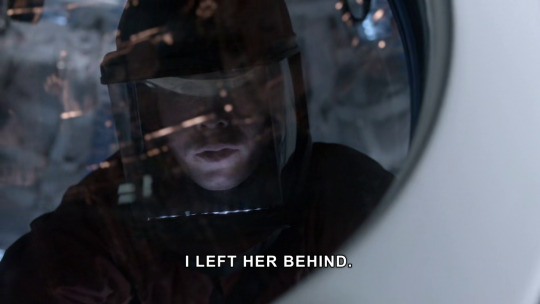
Oh Bellamy, you had no idea when you joked with Clarke back in 4x01!
It is such an interesting and heartbreaking end to the Clarke and Bellamy’s arcs in season 4 that she – after trying to be the Big Picture leader and save the human race for most of the season – ends up saving her friends, while Bellamy – who has tried to save any individual he could save today – was forced to leave one of the two most important people in his life to die.
Clarke never even knew for sure if they managed to open the hangar door and if they were alive. But while she thought she was sure to die (“My fight is over”) and was still putting all her efforts into saving her friends, no matter how difficult it was, she still has her survival instinct - after she had managed to align the satellite dish and finish her mission, she runs from the death wave into the lab.
Passing the Baton: I see what the show did there. Too bad the bottle was empty, as Jaha drank all of it in the season 1 finale. It’s also a sad reminder that Clarke and Bellamy never got to have that drink she was asking him to share in 1x09 and that he was offering her in 2z1x6. Will they have one in S7?
And the time jump is here. This scene is beautiful visually and thanks to Tree Adams’s music. I can even forgive the fact that Clarke’s lines are a bit too expositiony: she’s telling Bellamy about the bunker going silent and Eden being the only green spot on Earth, on the 2199 day that she radios him. But I guess she may be telling him the same every day, just in case it’s the first time he finally manages to hear her.
There are a lot of people who think that this was the best – or even the last moment when the show should have had Bellamy and Clarke get together. Many are really, really angry that it did not happen and that the show separated them instead. And this is where I completely disagree with a huge chunk of the Bellarke fandom. If they had both gone to space and started a relationship, that wouldn’t have been such a great resolution to this slow burn, wonderfully developed dynamic. But getting separated by a tragic twist of fate? Bellamy mourning Clarke and believing her dead for six years, while trying to honor her memory, while she is almost all alone and calls him every day without answer, for 2199 days? Bellamy learning she is alive and coming back, only for Clarke to learn he has a girlfriend now? Love triangle and a bunch of misunderstandings and a terrible conflict as a result of their separation? Coming back from it even stronger? Clarke “dying” again just a month after Bellamy got her back, and Bellamy forgetting everything else in his desperate quest to save her, brings her back with his love and faith in her? That’s a truly epic story, with the potential to be one of the best love stories ever seen on TV. Scratch that – it already is. I don’t even need to see them make out or say ILY for that to be true. I much prefer the story we got to the story that a lot of fans think they wanted.
Body count: Thousands of people, possibly millions, died all over the Earth – the majority of people who had survived the first apocalypse. Some in this episode – like everyone who was left out of the bunker. Others had already died before the timeline of this episode, as the death wave was hitting different places in the world at a different rate (as we saw in 4x01 with the people who died in Egypt). Among them were certainly the 365 Arkers who were left outside of the bunker, hundreds (thousands?) of Grounders, including Madi’s family and a lot of people from her community, and, no doubt, the wandering outcast Grounders (such as Zoran and Sienna from season 2). The show may have killed many people in seasons 1-3, but it really outdid itself here. At this point, as far as we know, only 1202 people are left alive on Earth, and 7 more at the Ring. We will later learn that 300 more humans are alive, in cryo sleep, on Eligius 4, and many others on Alpha.
Rating: 10/10 (because the problems I have with the episode are not big enough to compare to all that’s good about it)
#the 100#the 100 rewatch#the 100 season 4#the 100 4x13#praimfaya#clarke griffin#bellamy blake#bellarke#bellamy x clarke#john murphy#raven reyes#emori#monty green#octavia blake
47 notes
·
View notes
Note
After your binge-watching session, which would say is better: Kim Possible or Danny Phantom, and why?
Someone actually interested in my opinion for once?
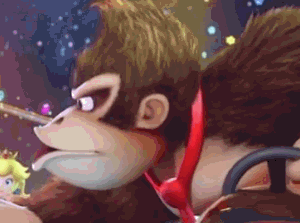
Well it depends, both have their pros and cons in regards to episode plots/arcs, characters and chara development, character designs etc. So I’ll suppose I’ll break them down into different categories. Under a cut as to not make scrolling a hassle.
Also I apologize in advance for my page theme, I know it’s kinda shitty and hard to read sometimes but I’m too busy to change it right now.
Designs/Art: I know Stephen Silver was the main designer for both shows (and his designs for a lot of the teenage girls has a uh, Obvious Pattern.) Ignoring my bias towards Vlad and Drakken, I think a lot of the ghosts have fun designs, but KP gets points for actually letting characters (esp Kim and Ron) wear other clothes in S2 and beyond, and between Phantom, S1 Kim and S4 Kim I think S4 Kim has the best “action” outfit. BUT the art style for DP is pretty stiff at times and KP style has a lot more range for animation, body types and faces. Overall though, I say they’re pretty tied imo. Both have a lot of ups and downs that truly comes down to a personal pref, even though the Fartman’s style is the more iconic one. I think KP wins animation/art and DP wins for designs.
Characters: Again, the villains shine here more than the protags. KP as such a wide range of villains that I have have to give them the point for creativity and FUN in antagonists, (Duff Killigan is prob my favorite in absurdity followed by Monkey Fist, the Seniors and DNAmy all tied for second. I really like Motor Ed too, seriously.) but that’s not to say that DP doesn’t have them either. Vlad’s true motivations are really...unique compared to other DP villains and even KP ones, (seriously? How many bad guys you know who’s goal in life is “fuck the MC’s mom and also make MC your son”) who like KP are just “take over the world and/or cause tons of destruction” but with only half the fun. Sadly Dark Danny’s entire thing hinges on him being Danny But Evil who only wants...destruction??? Whereas Evil Ron actually does something interesting with the character, showing Ron’s true potential (see Evil Ron vs Electronique in “Stop Team Go” for example) and being in-character for him still. (Faux Take Over The World plot to cover his true goal of owning all the world’s Nacos? Of fucking course Ron would. Brilliant.) Evil Ron still has hints of Ron’s personality (”Boo-yahaHAHAHA!”) whereas Dark Danny is just... evil for evil’s sake, which can be good when actually done right, but in this case isn’t because the only thing that resembles Danny is his outfit. Shego’s backstory is great. DP’s new S3 enemies are very boring despite interesting powers. KP S4’s Camille Leon is great but Warmonga is just eh. Moving on to protags, KP’s protags are far, far more interesting than DP’s. Which brings us to the next point. (Also Mr. Barkin > Mr. Lancer, and Kim’s parents > Danny’s parents.) KP gets this one.
Chara Development: Gonna say it, DP almost has none, and straight up regresses in very end of S2 and most of S3. I swear the only real characters who have any are Vlad (for better or for worse, the latter imo), Jazz (when they remember her, and is good) and Valerie (whose is good too). Tucker gets 3 (three!!) fking episodes about him and they ALL carry the same theme of him not being able to responsibly handle having any kind of power, which is why him becoming the town mayor at the end is so BAD. There’s NO WAY Tucker of all people would make a good mayor. VALERIE got more episodes than him, JAZZ got more episodes than him, both with development that STUCK while he’s a MAIN CHARACTER. Sam never changes, def for worse. Sam is a Base-Breaking Character for a dang reason. She’s extremely pushy, acts like she’s lowkey better than everyone else, and never seems to consider how her actions affect other people, and the like 1 or 2 times she does it doesn’t fucking stick like she’s Hank Hill or something. Danny has no real development for his character. All that develops for him are his powers and nothing else. On the other hand, KP characters DO have development and it shows! Not just for the protags but for villains too! Kim is bossy and a lil controlling early on and stops during S2, whereas Ron was extremely cowardly and gets, not exactly braver but just less phased by it all, plus early he never quite liked going on missions but later on gets sad if he has to miss them, before he doesn’t like being distractions but later on very much takes pride in being one, and etc. Drakken and Shego get development too, esp their relationship with each other AND with Ron and Kim. Bonnie actually got an episode of development (but sadly regressed in time for the finale) whereas Pauline just...never changes whatsoever. Bonnie actually makes for a good rival and mean girl for Kim for the entire show whereas Paulina and her relationship with Danny and Sam are just....bland and doesn’t go anywhere. There’s nothing for Dash, though Ron doesn’t really have an equivalent. So, KP gets this one.
Episodes/Plots/Arcs: DP wins in the Lore department by far, KP wins in character arcs. A Sitch In Time answers the great questions of What Would Happen if the Villains Teamed Up AND Shego is a Better Villain than Drakken so Why isn’t She in Charge? ft Time Travel. The Ultimate Enemy answers What If Danny Went Evil and Is Vlad Completely Irredeemable? ft Time Travel. KP definitely does the “balancing Hero duties with School life” better than DP. You can definitely see her struggles with it whereas DP is just kinda there. I also very much like that Kim is girly but is never shamed for it both in-universe and out, whereas DP is known for the shitty “I’m not like other girls” fake feminist bullshit. A problem I have with DP is that time pretty much never changes, as if the show takes place within a year, and it seriously hampers the growth of the show could have. Time is also just out of whack, they take their big end-of-the-year test then it’s Christmas THEN it’s Summer Vacation but even in S3 they’re all still in the first year of high school like ??? What?? Whereas KP starts in Freshman year and ends with Senior Graduation. The arcs of Danny/Sam vs Kim/Ron are just...D/S was definitely teased a ton more but by S3 you just get tired of it, not to mention the hypocrisy regarding the character relationships. Personal opinion warning, but Danny/Valerie had a lot more development in such a short time and was super interesting. Kim/Ron didn’t have as many teasing esp in S1 and S2 (it’s there though) but it def picks up in S3 and I love how their new relationship was handled in S4. Back to episodes, my favorite episodes for both are Reign Storm and So The Drama, but while I might be biased toward Reign Storm I’m gonna have to ultimately give better episodes overall to KP. So The Drama has Drakken going back to his Actually Dangerous roots from early on and becoming the closest to anyone to actually winning on his own merit (Shego stole the Tempus Simia from Drakken/Duff/MF and relied on weird time shit of Kim being “lost in the time stream” ((actual canon explanation)) to travel to the future specifically to stop her, to actually win) and is SO good when Dr. D finally gets defeated, plus (personal bias here) Kim and Ron’s teased hook-up finally happens. I will say though, I’m not a fan of S4′s Hana Stoppable/The Han story. As both shows are action-oriented, they definitely have their fair share of good fights but I think KP also has better action and fight scenes. Humor is extremely subjective but I think KP made me laugh more. Finally, DP is infamous for S3 just being bad whereas KP just got better and better with each season, though I’d put S4 below S3 and above S2. So: Lore = DP. Arcs, Action and Eps = KP.
Fandom: Ignoring the super gross shipping aspects of some parts of the fandom (If ur a P*mpousP*p or K*go shipper pls go away from my stuff i’m fucking serious), I think DP wins for this one. Many great OCs, (I really haven’t seen any for KP aside from next gen?) the already interesting lore is def expanded so much by fans, I legitimately don’t care for “Wes Weston” but my god did the fandom do some serious work for this boy. I don’t know too much about KP since the fandom seems kinda dead aside from some shipping stuff and a very slight revival from the movie, whereas DP ended before KP and is still very very active. DP wins fandom.
(Bonus) Reboots/Redesigns: I’m gonna be honest, I’m not sure what could be done better for KP aside from the mess of Disney’s out-of-order airings, a more serious reboot wouldn’t work for the show at all, but DP could definitely use a reboot and fixes the disaster of S3. And reboots & character redesigns are def a hot topic for the DP fandom. So DP gets this one, though I’m not sure if this is a good thing.
Final: So over all, 4 for KP and 4 for DP, or if you add the little groups, 7 for KP and 4 for DP. Overall, I’ll say KP is the better show, but DP shines with the fandom. I also have a personal bias in favor of DP but it makes them even out for me. If you want interesting lore and good fandom content, go for DP. If you want fun and interesting characters, actual character development and more action and drama, KP is the way to go.
But instead of picking one, just watch both!
11 notes
·
View notes